Music is for every body
Chicago’s concert venues have made welcome advances in accessibility, but a regulatory gray area lets them fall short of what they should be.
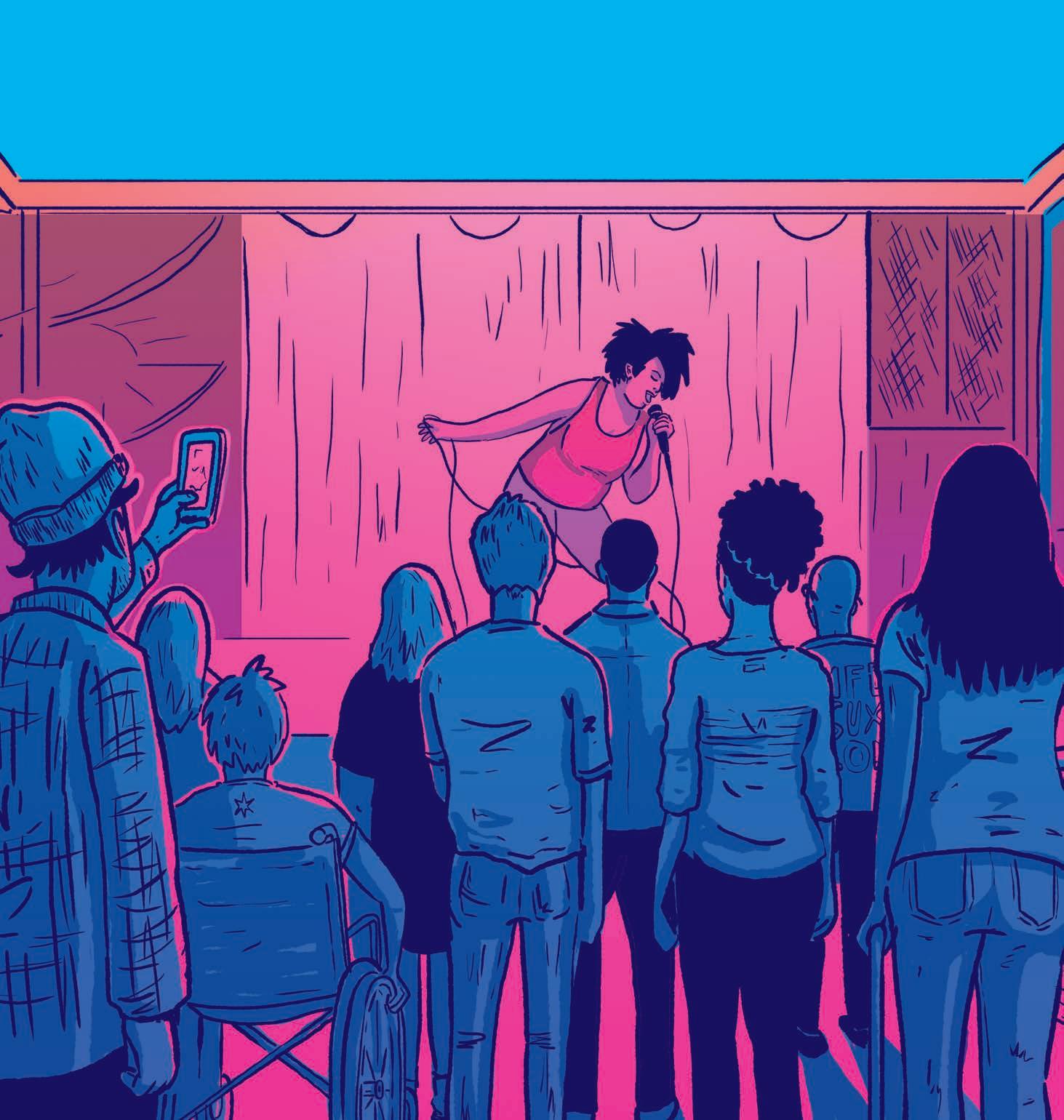 By BRIAN O’DONNELL 24
By BRIAN O’DONNELL 24

CHICAGO’S FREE WEEKLY SINCE 1971 | FEBRUARY 27, 2020
CITY LIFE
03 Transportation Thoughtful transportation advocacy requires intersectionality.
NEWS & POLITICS
04 Joravsky | Politics A few reasons why Trump released Blago from prison.
ARTS & CULTURE
10 Visual Arts Fashion designer Duro Olowu curates one of the MCA’s largest shows ever filled with local treasures.

environmental fable; the cocreator of Russian Doll lands a masterpiece in The Layover; and Mlima’s Tale shows the costs of the ivory trade.
this week
The Secret History of Chicago Music Bluesman Frank “Little Sonny” Scott Jr. gave his all to Maxwell Street for half a century.
Early Warnings Judas Priest, the Magnetic Fields, the Weeknd, and more just-announced concerts
Gossip Wolf Post-everything fusion band Je’raf celebrate their debut album, Nicky Flowers resuscitates a Morrissey-tweaking all-synth Smiths cover project, and more.
13 Lit Jasmon Drain’s debut collection adds him to the ranks of Chicago’s greatest authors.
14 Listings An emo variety show, an artistic chili cook-off, and more arts and culture happenings


THEATER
15 Dance Preview American Traffic celebrates the intersection of Irish and African American dance.
FILM
21 Review Kantemir Balagov solidifies his signature style with Beanpole.
22 Movies of note We Are Not Princesses, about Syrian refugee women rehearsing Antigone, shimmers; Brahms: The Boy II nails the porcelain doll’s ability to endear himself to those around him; and Fantasy Island is just another cautionary tale against remakes.

06 Dukmasova | News As the mayor spotlights the city’s eviction problems, court data shows little is changing—and Pangea is still filing the most eviction cases in Chicago.
16 Preview I Am Not Your Perfect Mexican Daughter follows a Latinx teen as she struggles for her own identity.
18 Review In Plano, three siblings share lives with messy men in an endless loop.
20 Plays of note The Ghost in Gadsden’s Garden is a delightful

MUSIC & NIGHTLIFE
24 Feature Chicago’s concert venues have made welcome advances in accessibility, but a regulatory gray area lets them fall short of what they should be.
30 Shows of note Wire, Ratboys, Chicago Flamenco Festival, and
OPINION
Savage Love Dan Savage offers
on how to outsource (and still satisfy) the sloppy and spitty stuff he likes.
PUBLISHER TRACY BAIM EDITORS IN CHIEF SUJAY KUMAR, KAREN HAWKINS CREATIVE LEAD RACHEL HAWLEY MUSIC EDITOR PHILIP MONTORO
THEATER AND DANCE EDITOR KERRY REID CULTURE EDITOR BRIANNA WELLEN
ASSOCIATE EDITOR JAMIE LUDWIG

SENIOR WRITERS MAYA DUKMASOVA, LEOR GALIL, DEANNA ISAACS, BEN JORAVSKY, MIKE SULA EDITORIAL ASSOCIATE S. NICOLE LANE GRAPHIC DESIGNER AMBER HUFF
LISTINGS COORDINATOR SALEM COLLO-JULIN CONTRIBUTORS ED BLAIR, NOAH BERLATSKY, LUCA CIMARUSTI, MARISSA DE LA CERDA, MARI COHEN, JOSH FLANDERS, SHERI FLANDERS, JACK HELBIG, IRENE HSAIO, CATALINA MARIA JOHNSON, MONICA KENDRICK, STEVE KRAKOW, NOËLLE D. LILLEY, JAMIE LUDWIG, MAX MALLER, ADAM MULLINS-KHATIB, J.R. NELSON, JEFF NICHOLS, MARISSA OBERLANDER, MATTHEW SIGUR, CATEY SULLIVAN
DIRECTOR OF DIGITAL JOHN DUNLEVY DIRECTOR OF PUBLIC ENGAGEMENT & PROGRAMS KRISTEN KAZA
SOCIAL MEDIA COORDINATOR JANAYA GREENE MEDIA PARTNERSHIPS COORDINATOR YAZMIN DOMINGUEZ
ADMINISTRATIVE ASSISTANT TARYN ALLEN
ADVERTISING
312-392-2970, DISPLAY-ADS@CHICAGOREADER.COM
CLASSIFIEDS: TALLEN@CHICAGOREADER.COM

SALES DIRECTOR PATTI FLYNN VICE PRESIDENT OF SALES AMY MATHENY
CLIENT RELATIONSHIP MANAGER TED PIEKARZ SENIOR ACCOUNT REPRESENTATIVES
LENI MANAA-HOPPENWORTH, LISA SOLOMON ACCOUNT REPRESENTATIVES GREG MCFALL, NANCY SANCHEZ CLASSIFIED SALES MANAGER WILL ROGERS
NATIONAL
VMGADVERTISING.COM JOE
1-888-278-9866
EILEEN RHODES SECRETARY JESSICA STITES AT-LARGE SLADJANA VUCKOVIC
CONSULTANT CAROL E. BELL
READER (ISSN 1096-6919)
CHICAGO
WEEKLY
IL 60616 312-392-2934, CHICAGOREADER.COM

2930
COPYRIGHT
2 CHICAGO READER - FEBRUARY 27, 2020 ll
more
33
35
35
36
advice
CLASSIFIEDS 38 Jobs 38 Apartments & Spaces 38 Marketplace
ADVERTISING VOICE MEDIA GROUP
LARKIN AND SUE BELAIR DISTRIBUTION CONCERNS distributionissues@chicagoreader.com 312-392-2970 CHICAGO READER L3C BOARD PRESIDENT DOROTHY R. LEAVELL TREASURER
IS PUBLISHED
BY
READER L3C
S. MICHIGAN, SUITE 102 CHICAGO,
© 2020 CHICAGO READER PERIODICAL POSTAGE PAID AT CHICAGO, IL ALL RIGHTS RESERVED. CHICAGO READER, READER, AND REVERSED R: REGISTERED TRADEMARKS ® THIS WEEK CHICAGO READER | FEBRUARY 27, 2020 | VOLUME 49, NUMBER 21 TO CONTACT ANY READER EMPLOYEE, E-MAIL: (FIRST INITIAL)(LAST NAME) @CHICAGOREADER.COM IN THIS ISSUE So you want a new president? The Back Room Deal podcast is back! Listen to Ben Joravsky and Maya Dukmasova talk Illinois delegate assignments. A Dusty Groove doc premieres in Chicago Danielle Beverly’s Dusty Groove: The Sound of Transition tells intimate stories about our deep connection to music. High Fidelity is poised to be an all-time top five The TV reboot remixes all the best parts of the movie into something even better. THIS WEEK ON CHICAGOREADER.COM ON THE COVER: ILLUSTRATION BY FRANK OKAY. FOR MORE OF OKAY’S WORK, GO TO FRANKOKAY.COM.
TRANSPORTATION
Don’t be a livable streets jerk
Thoughtful transportation advocacy requires intersectionality.
By JOHN GREENFIELD
Traffic safety and sustainable transportation boosters like myself like to believe we’re on the right side of history. I’m confident that in the future more people will get behind our efforts to reduce driving and crashes, and create better conditions for walking, biking, transit, and public space.
On the other hand, urban planning and livable streets advocacy have historically been dominated by relatively privileged folks, who are typically white, male, middle class or affluent, well-educated, aren’t living with a disability, etc. As such, there have been plenty of examples of livable streets advocates having blind spots when it comes to issues impacting marginalized communities.
This has sometimes resulted in policies and projects with unintended consequences, or transportation advocacy that actually does harm. So I wanted to take a look at ways that advocates can be better allies to social justice e orts, and avoid acting like what I call a livable streets jerk.
I was partly inspired by a New York City colleague’s recent tweet complaining about unlicensed entrepreneurs on the Brooklyn Bridge blocking bike and foot tra c. They posted a photo of a Black co ee vendor and tagged the NYPD. After many people pointed out that the post put the guy in danger of a potentially violent encounter with the police, the colleague,
to their credit, acknowledged on Twitter that they’d made an error.
In fairness, I’ve made my share of mistakes in covering sustainable transportation issues over the years. The most important rule I’ve learned is to always ask myself what the potential impacts of projects and policies may be on people from various marginalized groups.
I’m talking about questions like, if we ramp up tra c policing in lower-income communities with high levels of tra c violence as part of Vision Zero—the e ort to eliminate serious and fatal crashes—will that result in more racial profi ling and police abuse of Black and Brown residents?
Similarly, if Chicago responds to the recent wave of violent robberies on the el by deploying more police o cers in the system, how do we make sure that results in a net increase in safety and comfort for all riders?
If we extend a rapid transit line, build a nifty new walking and biking path, or make it easier to build dense, low-parking transit-oriented development (all good things in a vacuum), will that jack up property values, property taxes, and rents, a phenomenon known as “environmental gentrification”? If so, how can we preserve housing affordability and prevent the displacement of longtime poor and blue-collar residents?
Is it ever acceptable for a transit agency to
do a major facelift of a rapid transit station without making it wheelchair accessible?
Would increasing taxes on private Uber and Lyft rides to fight traffic congestion, as Chicago recently did, reduce the income of working-class and immigrant ride-hail drivers, or make it more expensive for women, trans people, and other at-risk individuals to feel safe while traveling home at night? If so, how can we mitigate these things?
You get the idea. If you’re a livable streets advocate, my advice is to try to avoid having blinders on about possible unintended consequences, even if they wouldn’t directly a ect you. The historic failures of privileged decision-makers to see this stuff is a big reason why it’s important to have all demographics represented in planning and advocacy, as well as the community input process.
Chicago leaders who fight for racial and economic justice on a daily basis shared some more thoughts on the subject. Former mayoral candidate and Austin Chamber of Commerce director Amara Enyia, who helped collect input for Vision Zero in west-side neighborhoods, notes that the potential for increased police abuse was largely o the radar of transportation o cials and mainstream advocates. “Nobody thought about the implications for communities that are already struggling with over-policing.”
Enyia credits Oboi Reed, who leads the mobility justice nonprofit Equiticity, with being a “crucial voice” for bringing that issue to the forefront by convincing the Active Transportation Alliance to cancel a planned Vision Zero summit with a $50 entry fee and an all-white speaker lineup.
“It’s important to avoid a narrow view of what safety is,” Enyia adds. She notes that while transportation advocates often focus on protecting people from dangerous drivers, mobility barriers like street crime and unfair enforcement, such as the CPD’s practice of heavy bike ticketing in Black and Brown communities as an excuse for searches, are often overlooked.
“I understand that people are passionate about protected bike lanes and transit-oriented development,” Enyia says. “But it’s important to think about how these things fit into the existing community and do culturally and contextually relevant outreach. That’s how you get buy-in and support instead of suspicion and pushback.”
Christian Diaz is co-chair of Elevated Chicago, which advocates for equitable transit-oriented development (TOD), and is lead housing organizer for the Logan Square Neighborhood Association, which fights displacement. In that swiftly gentrifying northwest side community, green projects like the 606 elevated trail, and the many dense, high-end developments that have sprung up near Blue Line stations since the City Council passed ordinances facilitating TOD, have fueled housing speculation.
A study released last month by DePaul University’s Institute for Housing Studies found that home prices along the western half of the 606 have risen by nearly 344 percent since 2012. And last week the developer of Logan’s Crossing, an upscale TOD that replaced the Discount Megamall, an indoor flea market that featured largely Latino vendors, announced that studio apartments will rent for a whopping $1,895 a month.
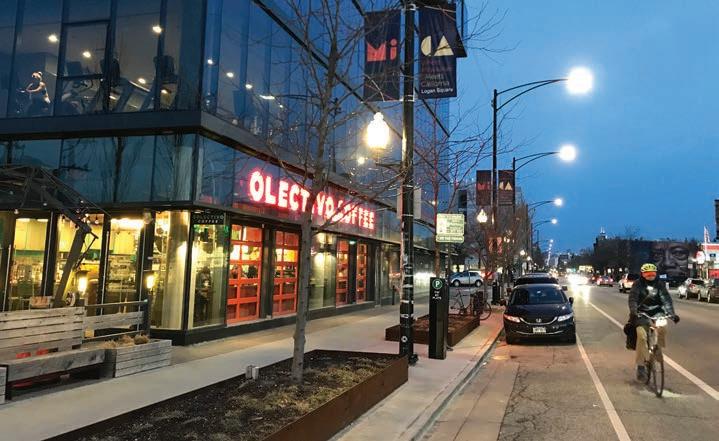
“We can’t just tack on sustainable transportation amenities to the racist monster that is gentrification and development in Chicago, in a neighborhood like Logan Square that has been historically redlined,” Diaz says. “We have to be mindful of how our work relates to that history. If only some neighborhoods get amenities like the 606 and nice housing near transit, there’s going to be competition for space, and demographics that have been historically propped up by government policies will have an advantage. Then we’re just reinforcing racial injustice.”
“We need our friends in sustainability advocacy to ask themselves who projects are for, and how we can make sure the benefits go to everyone, including the people who need them the most, not just rich white people,” Diaz says. He credits Active Trans with being “a great partner to LSNA” in recent years by building support for a 100-percent a ordable TOD next to the Logan Square Blue station, and helping to pass an ordinance last month freezing development along the west end of the 606 for six months so that the city can come up with an anti-displacement strategy.
Diaz has one more piece of advice for livable streets fans who want to be allies, not obstacles, to social justice in Black and Brown communities. “Listen. Don’t just come into our neighborhoods and tell us what we need. Hear our concerns. We bring as much to the table as transportation advocates, because I do think we’re on the same team.” v
@greenfieldjohn
FEBRUARY 27, 2020 - CHICAGO READER 3
The MiCA transit-oriented development near the California Blue Line station JOHN GREENFIELD
CITY LIFE
NEWS & POLITICS



POLITICS
Who’s next—Burke? Madigan?
A few reasons why Trump released Blago from prison.
By BEN JORAVSKY
It’s not often that I praise Donald Trump, but recent circumstances force me to do just that, so . . .
Bravo, Mr. President—your release of former Illinois Governor Rod Blagojevich from federal prison is one of the most spectacularly brazen acts of shameless chutzpah I’ve ever seen.
And I’ve seen lots of shamelessness, having covered Chicago politicians for almost 40 years.
Not that Blago deserved to spend more time in prison. He’d already served eight years on a 14-year sentence—enough’s enough already.

But don’t kid yourself into thinking Trump released Blago out of compassion for the Blagojevich family. C’mon, people, you’re too smart for that. As we all know, compassion is
not a Trump thing.
No, let’s run down a few of the real reasons Trump commuted Blago’s sentence.
One: Trump wanted to send a big fuck you to the federal prosecutors who are going after Michael Flynn, Roger Stone, and other miscreants in the presidential universe. These prosecutors are not literally one in the same, of course—but they’re cut from the same cloth: Dudley Do-Rights who, after a stint with the feds, go to work for corporate firms, where they get rich defending the same sorts of scoundrels they once prosecuted.
Speaking of shameless cynicism.
Two: it sets a precedent for the liberation of Stone and Flynn, et al. Sort of like a trial balloon—free Blago and see how it plays. And so far, it’s playing very well with the Trump
6 CHICAGO READER - FEBRUARY 27, 2020 ll
Pre-conviction Blago, approaching sister-in-law Deborah Mell, at an event celebrating passage of the state’s LGBTQ rights law
base. As for those Republicans who might be enraged? They’re too chicken to raise a fuss—but I’ll get to the Tribsters in a bit.






Three: Trump wants to legalize extortion—at least the extortion he apparently commits all the time.
Clearly, Trump doesn’t view what Blago did as a crime. Blago was found guilty of trying to strong-arm people into donating to his campaign.
It’s all very transactional—and Trump loves transactions. Blago had something of value—in one case, Obama’s senate vacancy—and he wanted to swap it for something of equal value. What, Trump may ask, is wrong with that?

Trump was up to the same thing when he got busted for trying to swap about $400 million in military aid to Ukraine for an announcement that Ukraine was investigating Joe Biden on corruption charges.
Four: Trump plans to put Blago to use in his reelection campaign. And here I’d like to pause from my list-making to voice my appreciation at the seamlessness with which Blago burst forth from prison.

I mean, the guy’s as fit as a fiddle. You’d have thought he spent the last eight years at a Canyon Ranch as opposed to federal prison. He reminds me of Steve McQueen’s character in The Great Escape —no matter how many times the Nazis throw him into the cooler, he comes out looking fresh as a daisy. Doesn’t even have to shave.

More to the point, from the moment Trump let him loose, Blago’s been a one-man Trump commercial, praising the president for leading the charge for “criminal justice.”







You can expect to hear Blago singing this song until November. Anything to convince voters—especially Black voters—that a vote for Trump is somehow a vote for justice.

At the same time, Trump and his justice department are resisting efforts by Mayor Lightfoot to set standards for police interaction with the public, especially young Black men.

Moreover, Trump and his local acolytes are waging war against Cook County state’s attorney Kim Foxx, who they think is soft on crime.
So, Trump will try to pick up a few Black votes (he only needs a few) for “reforming”
criminal justice, while satisfying his white base with endless talk about Jussie Smollett and Kim Foxx and throwing more Black people in jail.
Doesn’t get more cynical than that.
Well, all is not lost. At least I can watch Trump emasculate the Republican establishment in Illinois—the editorial writers at the Chicago Tribune included.
For years, Blago has been their poster child for all that’s corrupt with Democratic politics. And now Trump releases Blago from prison.
It’s funny to watch them struggle with this. They foam with rage at Blago. But they barely mention the man who sprung him.
To read a Tribune editorial or a John Kass column on this subject, you’d think Trump played no role in releasing Blago. As though Blago sprung himself from prison.

A similar thing happened in the 2018 governor’s race, when the Tribune ran frontpage stories about the tapes in which Blago chatted with J.B. Pritzker.
Governor Bruce Rauner and his allies were set to endlessly use those tapes to link one with the other—like putting Blago’s head on Pritzker’s body.
But then, Trump sort of turned Blago into a folk hero with the MAGA-hat crowd by talking about commuting his sentence. And just like that, the Blago-Pritzker tapes were virtually worthless.
It’s like all the other crimes of Trump— from intimidating witnesses to allegations of rape. The Republican establishment has to pretend they don’t exist. If they complain, the president will turn the base against them with one presidential tweet.
Hey, Mr. President, if you’re looking for other ways to intimidate Illinois Republicans, why stop with Blago? Chicago has no shortage of big-time Democrats either indicted or under investigation by the same sorts of federal prosecutors you despise.
That would include Alderman Ed Burke, your former property tax lawyer, and House speaker Michael Madigan.

Make corruption o cially legal, Mr. President—pardon them all!

Can you imagine Blago, Burke, and maybe even Speaker Madigan, in MAGA hats on stage at a Trump rally?
Man, I’d love to see the Trib sters try to write their way around that. v




FEBRUARY 27, 2020 - CHICAGO READER 7 NEWS & POLITICS
TRACY BAIM
@joravben MOBILIZE A series of political engagement events by the Chicago Reader Super Tuesday Watch Party Tuesday, March 3, 6-8 p.m., Free Promontory in Hyde Park, 5311 S Lake Park Ave W. Come join the Chicago Reader for ELECTION NIGHT WATCH PARTIES With hosts Ben Joravsky and Maya Dukmasova* Live Stream on the Reader’s facebook page *Dukmasova will just co-host the March 3 event.
Pangea still reigns














































 By MAYA DUKMASOVA
By MAYA DUKMASOVA


More than 17,000 Chicago renters wound up in eviction court last year according to 2019 court data obtained by the Reader from the Clerk of the Circuit Court of Cook County. The number of cases filed remains on par with city eviction filings since 2016, though the data provided by the clerk excludes sealed eviction cases. Pangea Real Estate remains Chicago’s most prolific filer of eviction cases, as the company has been since 2012.
According to the data, Pangea filed 1,264 cases in Chicago’s eviction courtrooms in 2019. Of those, 1,083 were against Chicago tenants and an additional 181 cases were fi led in Chicago’s courtrooms against tenants in their suburban properties. These cases represent a slight dip compared to the company’s fi lings against city renters in 2018, but Pangea still filed three times as many cases as the next most frequent fi ler, a third-party property management company called WPD Management.
A two-year investigation published by the Reader last year found that Pangea became Chicago’s most prolific evictor in the wake of the 2008 foreclosure crisis. Since it began operating in 2009, it has fi led more cases than
the next four landlords combined, at times accounting for as much as 20 percent of all eviction cases fi led in the south and west side zip codes where its holdings are concentrated. The company’s founders, who’d made a fortune in payday lending before the fi nancial crisis, took advantage of the avalanche of foreclosures to cheaply acquire apartment buildings by the block in neighborhoods like South Shore, Chatham, and South Austin. Over the years, Pangea’s real estate empire has grown to more than 7,500 units in Chicago, plus thousands more in suburban apartment complexes and in Indianapolis and Baltimore. Recently Pangea moved to acquire hundreds more distressed apartment units in Chicago that were operated by disgraced (and now bankrupt) nonprofit Better Housing Foundation.

While for years Pangea was fi ling the most cases in the 60649 zip code—South Shore— last year’s data shows its evictions are now most densely concentrated in the 60644 zip code, which covers the South Austin neighborhood on the west side.

In response to a request for comment, Pangea’s CEO Pete Martay wrote in an e-mail that as the “largest owner of privately funded













































in Chicago . . . it is un-







FEBRUARY 27, 2020 ll
market rate apartments
As the mayor spotlights the city’s eviction problems, 2019 court data shows little is changing.
A Spring Fling Flower & Garden Show after-party presents: Flower Power Happy Hour Thursday, March 19 4-7PM Floral inspired sounds by DJ Tess Cocktail and cider samples by Koval Distillery & Virtue Cider Panel on growing and harvesting cannabis at home After-hours access s: w r ur F ap A Sp
A Pangea apartment building at 5018 W. Jackson in the 60644 zip code, where Pangea is now fi ling the most evictions against its tenants.
TRAVIS ROOZÉE
fortunately unavoidable that our total eviction filings are higher than all of the other large operators.” Martay underscored Pangea’s singularity in providing unsubsidized housing in working-class neighborhoods, though about 20 percent of the company’s units are rented to tenants with Section 8 vouchers.
“We are devoted to working with our residents who have fallen behind on rent, well before it becomes necessary to consider fi ling a court case for non-payment of rent,” Martay continued. “Even after an eviction is fi led we continue to work with our residents, within the confi nes of the court system. . . . Pangea’s goal is not, nor has it ever been, for our residents to be physically evicted by the Sheri , nor to damage our residents’ ability to obtain housing in the future.”
The Reader ’s investigation found that Pangea has developed an aggressive and formulaic approach to eviction cases, o ering “payand-stay” deals to many of the tenants it takes to court. While these deals mean avoiding an immediate eviction for tenants, the Reader found that ultimately Pangea’s eviction rate reflected the city’s as a whole, with more than 60 percent of tenants winding up with a judgment against them. The pay-and-stay deals, negotiated by Pangea’s lawyers with tenants who rarely have their own attorneys, lock renters into a contract to pay monthly rent as well as regular payments toward their debt.
However, by signing the deals, tenants agree to give up their right to a trial; by the time they fall behind on these payments (as they often do), they’ve already agreed to be evicted and no longer have an opportunity to present any grievances about their landlord or the fairness of the deal to a judge.



As has been typical of the company’s response to questions about its evictions, Martay emphasized Pangea’s track record of investing “more than $350 million of private capital in the past 10 years in [Chicago] with a majority of those dollars directly overlapping with Mayor Lori Lightfoot’s new Invest South/ West Initiative and its 10 target zones.”
Lightfoot spotlighted evictions in her February 14 City Club address, while making sweeping promises to “end poverty in Chicago in a generation.” She promised to push a “tenant protection package designed to help residents by giving them a fair chance to stay in their home. . . . The fi rst part of this package will include an ordinance establishing just cause for eviction.” As she elaborated on what that would mean, Lightfoot said that “based on a recent study of data from 2010 to 2017 approximately 25 percent of all evictions are no-fault, meaning the tenant did nothing wrong but had to move anyway. These no-fault evictions can give tenants as little as 30 days notice to move . . . Our new ordinance will extend the notice period for no-cause evictions.”
Lightfoot didn’t say how much longer the notice period would be.
No-cause evictions often take place in gentrifying neighborhoods, when developers and


FEBRUARY 27, 2020 - CHICAGO READER 7
NEWS & POLITICS JAMEST. DERICO O JUDGE JR. CIRCUITCOURTOFCOOKCOUNTY (CoghlanVacancy) VoteMarch17,2020PUNCH #187 www.derico4judge.com Paid for by the Committee to Elect Judge James T. Derico, Jr.
continued from 7
landlords serve 30-day notices to existing tenants in order to rehab buildings and rent out units at higher prices. “Just cause” eviction laws as they exist elsewhere in the country aren’t just designed to give people more time to move if they’re being evicted simply because the landlord wants them gone. These laws typically make it so that landlords cannot evict tenants unless they have a good reason, such as nonpayment of rent, chronically late rent, lease violations, etc. The Reader asked the mayor’s o ce to elaborate whether Lightfoot’s proposal would actually establish protections against no-cause evictions or only focus on extending the time people had to move.
In an e-mailed statement, the mayor’s o ce reiterated support for the idea of making landlords give far more advance notice to tenants they’re evicting without cause, but didn’t say Lightfoot would be pushing for a law prohibiting landlords from evicting without cause. “Mayor Lightfoot knows that housing instability and evictions play a significant



role in the cycle of poverty impacting so many individuals in our city, particularly in communities of color,” wrote deputy press secretary Eugenia Orr. “To ensure that more residents have stable, affordable housing, the administration is working collaboratively with members of the City Council to bring forward a series of reforms that will allow people— including [formerly incarcerated] residents who are systematically excluded from securing housing—to get an apartment, and have a real chance to stay in their homes so they can provide shelter to their families, keep a job, and contribute to our economy. The administration wants to fi nd pragmatic solutions to address the needs of these residents at risk of falling into a cycle of poverty because of housing instability and discrimination and improve the city of life for every community.” v

Read Maya Dukmasova's May 2019 cover story “Pangea has taken thousands to eviction court. The story of an apartment empire.”
@mdoukmas
8 CHICAGO READER - FEBRUARY 27, 2020 ll NEWS & POLITICS

FEBRUARY 27, 2020 - CHICAGO READER 9
VISUAL ARTS
The mix master
Nigerian-born, London-based fashion designer Duro Olowu curates one of the MCA’s largest shows ever filled with local treasures.
By ISA GIALLORENZO
Museums can often feel like a cold, overly formal place. On one hand, that setting promotes an aura of respect around the artwork; on the other, it can lengthen the distance between the art and its viewer. “Duro Olowu: Seeing Chicago” is an antidote to that.
“You’re going to see color, and patterns, and texture—not just in the art but in the way things are presented on the pedestals and on the walls,” says Naomi Beckwith, senior curator at the Museum of Contemporary Art Chicago, which organized the exhibition, one
R“DURO OLOWU: SEEING CHICAGO”
2/29-5/ 10, Museum of Contemporary Art Chicago, 220 E. Chicago, mcachicago.org, $15, $ 8 students and seniors, free kids 12 and under and members of the military, free for Illinois residents on Tuesdays.
of the largest show ever put on at the MCA. Beckwith didn’t curate it, though; that role was undertaken by Duro Olowu, a Nigerian-born, London-based fashion designer. His namesake boutique in London was a harbinger of things to come—a mishmash of his own designs and a collection of pieces that appeal to his taste. The shop displays traditional and cutting-edge artworks alongside vinyl albums, books, tapestries, and decor objects. Anything goes, as long as he likes them. “He’s interested in flattening these distinctions that we may put up around art,” Beckwith says. “Like, what is fine art, and what is found art, what is inspired versus what is academic.”
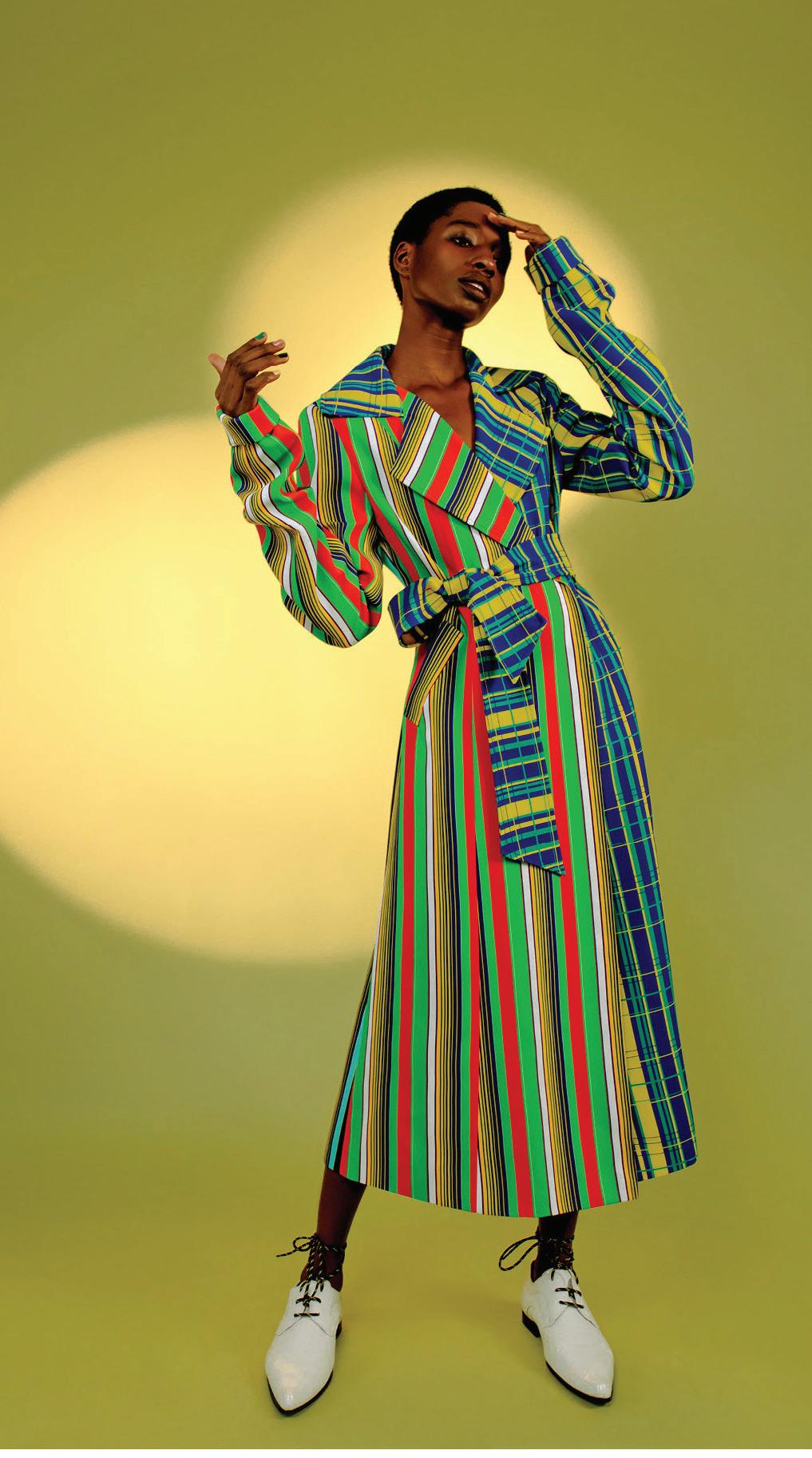
“It’s like walking into the coolest museum shop with handpicked items that have been curated so perfectly by the master of all masters,” says Ikram Goldman, owner of the Ikram boutique in the Gold Coast and the person who first brought Olowu’s designs to Chicago. She met Olowu through a mutual friend in the early 2000s before he launched his label in 2004. Olowu presented his collection to Goldman in a hotel she was staying at in New York. “I remember thinking, ‘OK, I know he’s showing me these, but I know there’s a lot more magic
where this came from.’ And it’s been that way ever since. He has a taste level beyond anyone I’ve ever known.”
Olowu grew up going back and forth between Lagos, Nigeria, and London. His father was Nigerian and his mother was Jamaican. The fourth of six siblings, he was raised in a large family that encouraged his artistic endeavors. Fashion has been a lifelong interest; his parents always valued the art of dressing well. His mother taught him early on how to compose a look, mixing high fashion and local West African fabrics. Once it was time to go to college, Olowu followed his father’s footsteps and studied to be a lawyer at the University of Canterbury in England in the 80s. He practiced law but began designing his own clothing and then launched his eponymous brand. He hit the jackpot when Vogue editor Sally Singer loved a dress he designed. Dubbed “The Duro dress,” it is fashioned in Olowu’s signature mix of vibrant prints and features a V-neck, empire waist, and wide sleeves, slightly evocative of a kimono. That dress led to him being named the Best New Designer at the British Fashion Awards in 2005. Since then he’s put together two critically acclaimed pop- up shops/art shows at Salon 94 gallery in New York and a blockbuster exhibit at the London Camden Arts Center in 2016 entitled “Making & Unmaking.”
Famous for creating unexpected yet harmonious combinations of vivid prints, Olowu also takes his tailoring seriously. According to Goldman, what makes his garments special is “a lightness in fabrics and extraordinary taste in color and print mix.” “He comes from a very authentic place and it translates in his collections,” Goldman says. “There is no one I know who makes clothes that are as flattering as Duro does. It all seems to fit beautifully on a body. Clearly [my clients] love him and they treasure his pieces—they come in just to get his things. He’s a treasure.”
The admiration, Olowu says, is mutual. “The manner in which the wonderful women of Chicago have supported my career in fashion and wear my womenswear collections which are
10 CHICAGO READER - FEBRUARY 27, 2020 ll ARTS & CULTURE
Duro Olowu, Spring/Summer 2020, Look 7
CHRISTINA EBENEZE
sold there is really inspiring,” he says. “Like the city’s museums and private collectors, these women are enthusiastic, curious, and keen to explore new ideas in their original form. They also love quality over trend, something that is a wonderful and unique trait.” One of those women was Michelle Obama, who first discovered Olowu’s designs while her husband was running for president. She subsequently sported many of Olowu’s garments in o cial engagements and even got him to decorate a room in the White House for Christmas in 2015.
Now Chicagoans will have the opportunity to savor Olowu’s vision in a di erent way. “For me, both [curating and designing] require an intuitive eye and a free hand in order to reflect the real and cosmopolitan world we live in,” Olowu says. “I feel very lucky and inspired to be able to do both.”








Olowu’s London boutique serves as inspiration for one of the later sections of “Seeing Chicago.” Some of his designs are displayed in that area, but they are far from the central focus. The bulk of the exhibit consists of almost 350 objects, all borrowed from local public and private collections. Most of them belong to the MCA, but many come from places such as the Art Institute of Chicago, Block Museum of Art, South Side Community Art Center, the National Museum of Mexican Art, the DuSable Museum of African American History, and Intuit: The Center for Intuitive and Outsider Art.
“I began with the idea of exposing and showcasing the amazing MCA Collection, which exemplifies this city’s original approach to contemporary art and culture,” Olowu says. “But I soon realized that a much more generous and open approach to the city’s public and private collections was necessary to honestly and justly convey the unique sensibility of museums and collectors in Chicago. The duty and
beauty of museums is to hold up a mirror to its audience regardless of social standing or class and create a unifying experience with local and international art in a way that is a source of pride for the people of the city. The MCA has given me the opportunity to create an exhibition that I hope is an example of this.”
Some of the featured artists include turn-ofthe-century groundbreakers like Henri Matisse and René Magritte, and contemporary names such as David Hammons, Barbara Kruger, Ana Mendieta, and Fred Wilson. Even though there will be works from across the world, dozens of artists connected to Chicago will be on display. Amongst them are Dawoud Bey, Simone Leigh, and Kerry James Marshall as well as leaders of local movements AfriCOBRA and the Chicago Imagists. There will be rare surrealist art books by Duchamp, Giorgio de Chirico, and Salvador Dali. “That kind of international, or what we’ve been calling cosmopolitan and transcultural view of not only the history of art but also of the city, is very important,” Beckwith says.






The way Olowu displays his selection is an art in itself. Instead of the usual stark white cube, artworks are placed against colorful walls in shades of orange, purple, and teal. Paintings and photographs are installed vertically, or “salon-style,” in arrangements that promote unexpected conversations between the pieces.


“It’s so exciting for me to see a Matisse painting mirror an African sculpture. Starting to make those kinds of leaps into our imagination is going to be really incredible,” Beckwith says. “I don’t think we realize that when we go to museums, oftentimes the work that we see in one specific gallery or in one show is usually like for like. That is to say that all the works in African sculpture are in the African galleries. All the works by French painters of the late

FEBRUARY 27, 2020 - CHICAGO READER 11 ARTS & CULTURE
Magdalene Odundo, Teardrop I, 1996. Collection The Art Institute of Chicago, © Magdalene Odundo THE ART INSTITUTE OF CHICAGO/ART RESOURCE, NY
SECOND CHANCE PROMOTION Enter eligible tickets into a drawing to win 1 of 10 trips to Las Vegas! Visit IllinoisLottery.com to learn more
continued from 11



19th century are in another gallery by themselves. All the pottery from Asia is either in the Asian gallery or in the decorative arts gallery. We began to separate things out in ways that feel logical, but what it doesn’t often allow is













for things across cultures to speak to each other, or things across time periods to live with each other. Duro kind of ignored those basic art historical claims and just asked us to realize the a nities that art may have, across the country, across the world, across time.” v

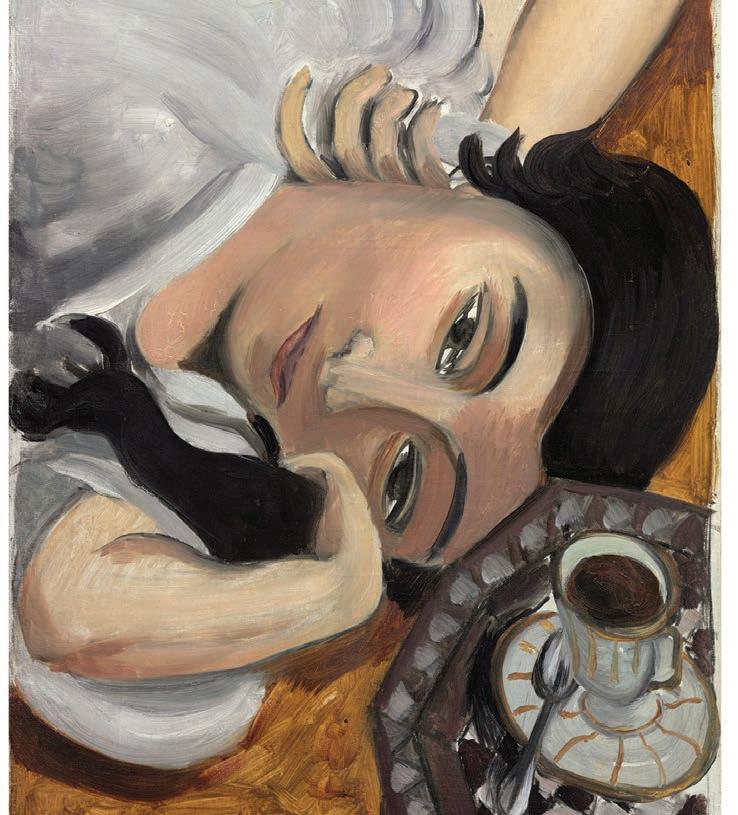
12 CHICAGO READER - FEBRUARY 27, 2020 ll
Henri Matisse, Laurette with a Cup of Coff ee, 1916–17. Collection The Art Institute Chicago, © 2019 Succession H. Matisse / Artists Rights Society (ARS), New York THE ART INSTITUTE OF CHICAGO/ART RESOURCE, NY
Jasmon Drain makes his mark

His debut collection, Stateway’s Garden, adds him to the ranks of Chicago’s greatest authors.
By DMITRY SAMAROV
It’s not often that a writer will make me see Chicago in a new way, but with his debut collection of interlocking stories, set primarily in Bronzeville’s now-demolished Stateway Gardens housing project for which the book is named, Jasmon Drain has done just that. A young boy named Tracy is our primary guide and narrator, but by the end even the high-rises themselves become fully fleshed-out characters. Though sometimes dreamy with longing for the comforts of a childhood, which, from the outside, appears filled with privation, Drain—who grew up in

Englewood and now lives in Kenwood—has fashioned an indelible portrait of this city.
The looming presence over much of Stateway’s Garden (Random House) is Tracy’s mother. She haphazardly raises Tracy and his older half brother, Jacob, while focusing much of her attention on keeping her looks and finding a man who will stay. The lessons she imparts to her children are blunt and unsentimental. “Life isn’t about fun. It’s about money,” she spits out at Jacob when the boy tries to refuse to go with her to a short-lived job at a store back on the west side, where
she’d grown up. To Tracy, who visits this store only once, it is a world of wonder, but to his mother it is but a tiresome means to an end. The chasm between an adult’s perception and that of a child has rarely been evoked so precisely and heartbreakingly.
Tracy’s overriding wish is for his mother to love him and pay him attention, but he observes her with a mixture of fascination and fear: “Mother stood slowly and put both hands to her knees to guide her legs straight. She released a groan while standing, then walked into the hall, past my bedroom, and made the left turn to the bathroom. She didn’t shut the door. She hardly ever shut the door while in there.” Here and through many other moments throughout these stories, Drain nails how strange, even foreign, those closest to us can be.
When Tracy and the other boys want to visit other parts of the city, they jump the fence and run across the Dan Ryan Expressway, dodging speeding cars, then vault over the barrier, taking care not to touch the third rail, onto the 35th Street CTA platform. It’s a harrowing way to catch a public train, but these boys have no other means to experience places outside their immediate environment. Everyone in these stories is striving to find a better life, to get out of the projects, to live out their dreams. But it’s not so easy to forget where you come from; nor do you necessarily want to, when being honest with yourself.
In the second-to-last story, “Love-Able Lip Gloss,” Jacob, a beautiful cipher for much of the book, tells his story. Now an overweight, middle-aged man, he can’t let go of his past as a youthful heartthrob. He carries on an on-again, o -again masochistic a air with his childhood sweetheart, a woman who managed to leave Stateway Gardens behind. But Jacob couldn’t take the leap when given the opportunity and is stuck instead romanticizing the past and ruing what might have been. Jacob is but the last of the people Drain describes in all their complexity. He is not a writer who tra cs in caricature or simplification.
I’ve known of the streets and buildings in this book for decades, but now feel like I’ve been there. Through slyly poetic language and an absolute grasp on place and description, Drain has added to the canon of Chicago literature. He belongs on the shelf next to Algren, Brooks, Dybek, and Wright—writers who know and love this city in all its magnificent contradictions, its unique, ugly beauty. v
FEBRUARY 27, 2020 - CHICAGO READER 13 ARTS & CULTURE
LIT
Things to do
COMEDY
New Player Has Entered the Show
This show that combines video games and stand-up comedy celebrates its two-year anniversary. Performers include Joe Kilgallon, Samantha Berkman, Skyler Higley, and Sohrab Forouzesh. Challenge host Dane Arden to game of Mario Tennis 64 a er the show for a chance to win his Nintendo Switch. Wed 3/4, 8 PM, Emporium Wicker Park, 1366 N. Milwaukee, facebook. com/newplayershow. F
So Emo
Yaz Bat hosts this variety show featuring music, comedy, and drag from past and current emo kids. The lineup includes Sharron Palm, Elias Rios, Mike Stricker, Fauz Pa, and Emma Grace and the night also includes raffles and an emo costume contest. Mon 3/2, 8 PM, Elixir Andersonville, 1509 W. Balmoral, facebook.com/ soemolol, $10, $5 in advance.
VHS: Leap to the Future
Enjoy some of the best Leap Day-themed VHS clips with stand-up from Tucker Brookshire, Lucia Whalen, Chris Santiago, and Clare Austen-Smith. Sat 2/29, 10 PM, the Lincoln Lodge, 2040 N. Milwaukee, thelincolnlodge.com, $7.

DANCE
Alvin Ailey American Dance Theater
Four programs from the Ailey repertoire, featuring a mix of ten different pieces, make up this year’s visit to the Auditorium. The pieces include the midwest premiere of Jamar Roberts’s Ode, a meditation on the beauty of life in a time of gun violence; Aszure Barton’s BUSK, an ensemble work on “the fragility, tenderness, and resilience that exist within the human experience”; a revival of Judith Jamison’s 1984 piece Divining, using dance idioms from across Africa; Donald Byrd’s Greenwood, exploring the 1921 Tulsa Race Massacre; Ella, Ailey artistic director Robert Battle’s duet set to music by Ella Fitzgerald; founder Ailey’s masterpiece, Revelations, which premiered in 1960 and has been the company’s signature work, and more. 3/4-3/8: Wed-Fri 7:30 PM, Sat 2 and 8 PM, Sun 3 PM, Auditorium Theatre, 50 E. Ida B. Wells, auditoriumtheatre. org, $35-$130.
Trinity Irish Dance Company
Three world premieres and one Chicago premiere make up this program from Trinity Irish Dance, celebrating its 30th anniversary this year. Choreographers Michelle Dorrance and Melinda Sullivan’s American Traffic combines Irish step and American tap. Irish dancer and choreographer Colin Dunne premieres Listen, described as “a deconstruction of Irish dance with respect for the ancestors.” TIDC founding artistic director Mark Howard and associate artistic director Chelsea Hoy collaborated on the world premiere of Home, “a percussive tour de force where every-
body brings something to the table.” In its Chicago premiere, Goddess, choreographed by Sean Curran, blends Irish and Indian movement traditions. Sat 2/29, 2 and 7:30 PM, Auditorium Theatre, 50 E. Ida B. Wells, auditoriumtheatre.org, $35-$78.
LIT
Colloquium Under a Palm Tree: A Reading
A reading responding to writer Gloria Anzaldúa’s text “La Prieta” from the 1983 anthology This Bridge Called My Back (1983), and Cuban anthropologist Fernando Ortiz’s ideas on “transculturation.” With Minh Nguyen, Jacobo Zambrano-Rangel, Andres Hernandez, Natalia Piland, and Jeremy Sublewski. Wed 3/4, 6:30 PM, Threewalls, 2738 W. North, three-walls.org. F
My America: Sawako Nakayasu
In conjunction with the exhibition, “My America: Immigrant and Refugee Writers Today” artist Sawako Nakayasu will be giving a perspective of writing and translating. Tue 3/3, 6:30 PM, American Writers Museum, 180 N. Michigan, second fl oor, americanwritersmuseum.org, $10, free for members.
Pecha Kucha Night (Vol. 53)
A dozen presenters from all walks of life are given the chance to explain their work using 20 slides. This edition features photographer Jeff Phillips, artist Shannon Downey, artist Darryl Moody, and Sam and Eli Merritt, cofounders of the Chicago Maker Space. Tue 3/3, 8 PM, Martyrs’, 3855 N. Lincoln, martyrslive.com, $12, $10 in advance.
Zine Club Chicago: Fascination Edition
Zine Club Chicago meets this month to discuss zines that make them excited and happy. Bring your favorite zine and join the conversation. Snacks are included. Thu 2/27, 7 PM, Quimby’s Bookstore, 1854 W. North, quimbys.com. F
PARTIES
Charlie & the Hashbrown Factory: 10th Annual Spudnik Press Chili Cook-Off
Spudnik is hosting their unforgettable chili cook-off for their tenth year. Sixteen competing chefs will be challenged to make the best chili. Featured galleries and creative outlets in the cook-off are Candor Arts, Chicago Printers Guild, Hyde Park Art Center, Rohner Press, and One Design. Sat 2/29, 5-9 PM, Spudnik Press, 1821 W. Hubbard, spudnikpress.com, $40, $25 for artists and anyone 21 and under, $8 for kids 6-16, kids 5 and under free.
Moans: All Trans Showcase
Featuring an all trans cast of performers, DJs, and vendors, Moans celebrates trans people of all variance. Tunes by Ariel Zetina, Hinkypunk (Kyah Hawk) as guest co-host, and Alex Jenny, Zolita (Zola Chatman), Loki Loko (Miles Billedo), and vendors Lucy Stoole, JForPay Designs, and Gnat Glitter Kink. Thu 2/27, 10 PM-1 AM,
Berlin, 954 W. Belmont, berlinchicago.com.
Mobilize: Super Tuesday Watch Party
Watch the delegates roll in with the Reader’s own Ben Joravsky and Maya Dukmasova. A livestream will be available to view on our Facebook page. Tue 3/3, 6-8 PM, the Promontory, 5311 S. Lake Park, facebook.com/ chicagoreader. F
Superhero Fetish After-Hours at the LA&M
A&M will be hosting a fetish superhero event which coincides with C2E2. Revolution Brewing has donated beer for the event (as well as wine, soda, and water). Superhero or cosplay attire is highly encouraged. Fri 2/28, 6-9 PM, Leather Archives and Museum, 6418 N. Greenview, leatherarchives.org. F
VISUAL ARTS
“Fenestrated Shape”
Robin Hustle describes her work as “so rock monuments,” in ceramic form. She is a community health nurse, writer, and ceramicist whose work has covered foraging, sex work, emotional labor, health, gender, and nurturance. Opening reception Sat 2/29, 6-9 PM. 2/29-3/21, Thu 4-7 PM, Sat 1-4 PM, Roman Susan, 1224 W. Loyola, romansusan.org. F
50th Anniversary Celebration of John Cage’s HPSCHD
This free multimedia performance takes palce at Preston Bradly Hall marking the 50th anniversary of this immersive piece by John Cage and computer pioneer Lejaren Hiller. Sat 2/29, 1-4 PM, Chicago Cultural Center, 78 E. Washington, chicgoculturalcenter.org. F
“Homo-entanglement”
In galleries one and two, married collaborators Miller & Shellabarger look at romance, physicality, duality, and time in their work. Utilizing performance, photography, books, and sculpture, the pair focus on queer identities and experiences. Opening reception 2/29, 5-8 PM. 2/29-3/11, Tue-Sat 11 AM-6 PM, Western Exhibitions, 1709 W. Chicago, westernexhibitions.com. F
“Pottery of Protest”
The pottery studio hosts its third annual Protest Exhibition where students and staff will present their work. The show is inspired by politics, environmentalism, racism, sexism, and other sociopolitical concerns. All proceeds from this opening will go towards Inner-City Muslim Action Network. Snacks will be provided. Sat 2/29, 7-10 PM, Lincoln Square Pottery Studio, 4150 N. Lincoln, comeplaywithclay.com. F
Studio MODA: The 2020 Winter Fashion Show
MODA’s annual Winter Fashion Show draws more than 1,000 guests from UChicago and beyond. The show will include a cocktail reception, a runway show modeling designs by students, and an a er-party. Fri 2/28, 8-10 PM, Zhou B Art Center, 1029 W. 35th, modachicago.org, $30. v
14 CHICAGO READER - FEBRUARY 27, 2020 ll ARTS & CULTURE
Maya Dukmasova and Ben Joravsky will host Mobilize: Super Tuesday Watch Party
LENI MANAA-HOPPENWORTH
American Tra c celebrates the intersection of Irish and African American dance
Trinity Irish Dance Company’s world premiere steps out at the Auditorium.
 BY IRENE HSIAO
BY IRENE HSIAO
In the 19th century, amid social unrest, crime, and infectious disease in the lower Manhattan neighborhood of Five Points in New York City, an American dance was brewing. The source of this new creative energy was a combination of cultures colliding and competition. “Black people and Irish people were on the street corner together, in the music halls together, in the pubs together,” notes choreographer Michelle Dorrance. “And Irish were referred to as Blacks, and Black dancing was called jigging.” In the 1840s, a series of contests, or “challenge dances,” spearheaded by Irish dancer John Diamond (sometimes referred to as the “greatest white minstrel dancer”) brought the blackface performer headto-head with the young man who replaced him in P.T. Barnum’s show, William Henry
Lane, known as “Master Juba.” Juba roundly triumphed over the ill-tempered Irishman in all but one contest, staged in cities nationwide.
Described by Charles Dickens as “the greatest dancer known,” Juba gained worldwide fame as the only Black dancer in all-white minstrel companies and the first Black performer to be billed above a white performer in minstrel shows.
“Tap dance was born on the southern slave plantations,” says Dorrance. “A lot of slave uprisings were organized by drums, [which were] central to West African culture.” Body percussion, or “patting juba,” arose as drums were outlawed by plantations. “Tap dance was born in that dire need for expression and communication,” she explains. “And those famous contests between African American dancers
and Irish dancers in the 1800s pushed tap and American Irish dance forward. It’s sewn into the history of tap dance. Early tap, then called ‘buck dancing’ or ‘buck and wing,’ lives on the balls of the feet, which is where Irish dance lives. Juba was able to imitate the Irish dancers’ approach to buck dance. And he would imitate them imitating him. Who knows what kind of masterful mockery that was? He was described as doing things people had never seen—he was a masterful innovator. Tap dance is rooted in improvisation. That kind of conversation with the feet is part of the development of the form. It lives in those early contests.”
These thoughts of cultural exchange drove the creation of American Tra c, a new work commissioned by the Auditorium Theatre for Chicago’s Trinity Irish Dance Company by Dor-
rance, a MacArthur Fellow and artistic director of Dorrance Dance, and Dorrance artistic associate Melinda Sullivan. “Trinity Irish Dance Company is a contemporary Irish American company rooted in the traditions of Irish step dance,” explains TIDC associate artistic director Chelsea Hoy. “We push the boundaries of the form through a performing arts lens. One way we do that is by collaborating with movers from di erent genres. Michelle Dorrance’s work bears similarities to ours in the way that it honors the ancestors.”
“We were interested in breaking down the rigidity and traditional carriage of Irish step dancing,” says Dorrance. “We wanted to explore a pedestrian quality. The execution of Irish dance is so beautiful but often rigid. The arms are held. In tap, we often have a relaxed upper body and an organic approach.” The title of the work began as a joke, she says—simply a way of organizing the negotiation and exploration of space. “The rule was, when they would pass each other, pass on the right—literally ‘American tra c.’ But it became this thing that reflected a culture that has such depth in its ancestry. Tap is one of the oldest—in terms of immigrated Americans—American dance forms. There’s constant exploration in the piece, and exploration of identity. It’s not about some heavy emotional drama, it just lives in the fiber of the work.”
The exploration of technique and identity is central to TIDC’s mission of innovation in Irish American dance. TIDC was founded in 1990 by Yorkshire-born, Rogers Park-raised Mark Howard, who studied at the Dennehy School of Irish Dance—where fellow Irish American Chicagoan Michael Flatley also trained. Whereas Flatley’s Riverdance became a global phenomenon when it premiered in 1995, Howard has refused traditional Irish dance competitions and Broadway-style spectacles. “We’re the only art-driven ensemble repertory Irish dance company in the world,” says Hoy.
“How are you still doing what you love when [ Riverdance ] turned into this multimillion dollar thing?” Dorrance recalls asking Howard. “He replied, ‘We just want people to connect with what we do.’ And I thought, ‘That’s exactly what I feel about my art form.’ To exchange the roots of our culture, the rhythmic ideas, to learn more about our techniques, where they came from, and why—that’s fascinating.” v
@IreneCHsiao
FEBRUARY 27, 2020 - CHICAGO READER 15 THEATER
DANCE PREVIEW
Trinity Irish Dance Company LOIS GREENFIELD
THEATER
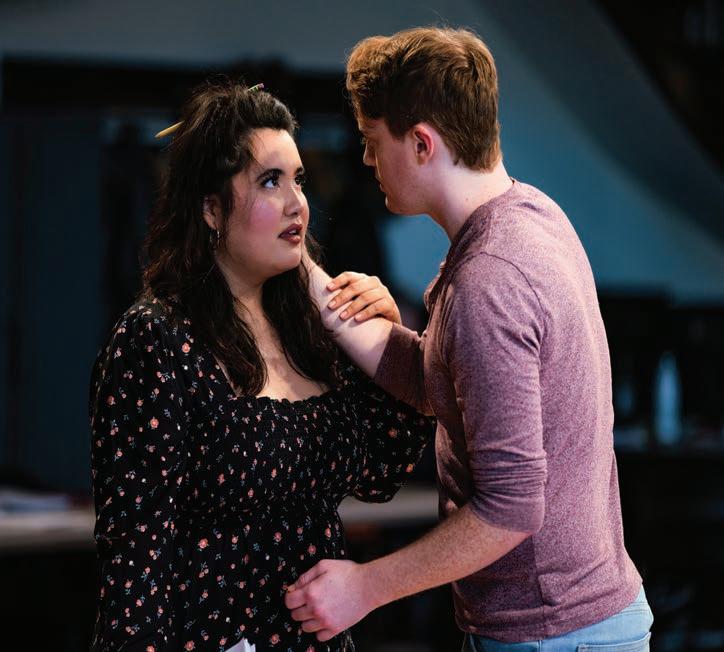 By MARISSA DE LA CERDA
By MARISSA DE LA CERDA
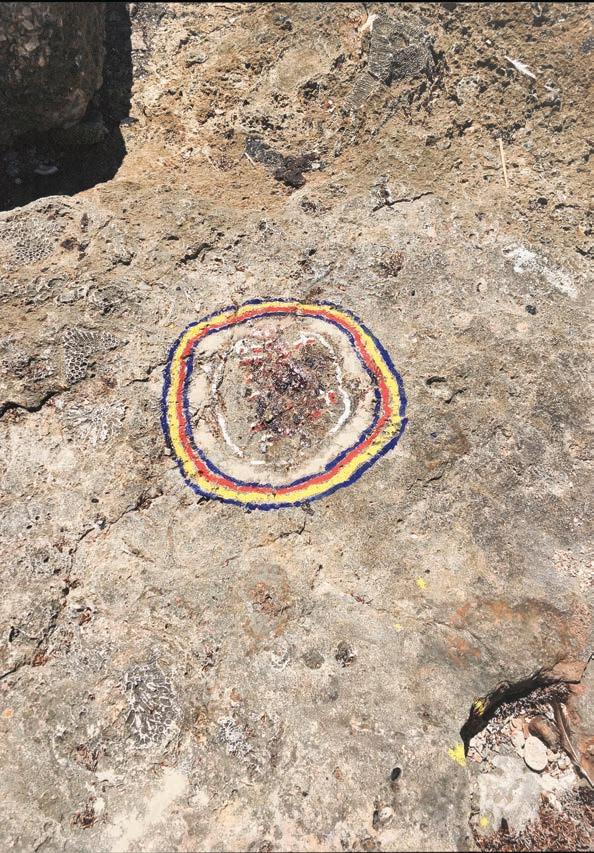
16 CHICAGO READER - FEBRUARY 27, 2020 ll
I Am Not Your Perfect Mexican Daughter LOWELL THOMAS
PREVIEW Breaking free from the ribbons of grief I Am Not Your Perfect Mexican Daughter follows a Latinx teen as she struggles for her own identity.
I n 2017, young Latinx people entered the mind of Julia Reyes, the protagonist in Erika L. Sánchez’s New York Times bestselling novel, I Am Not Your Perfect Mexican Daughter. Now through March 21, they can enter her world and serve as her confidant in the stage adaptation premiering at Steppenwolf, as part of the Steppenwolf for Young Adults series. (Sandra Marquez directs.) The story follows teenager Julia, an aspiring writer from Chicago who is often seen as rebellious and a nuisance by her family, as she Harold Mendez March 8 January 24 Logan Center Gallery • Reva and David Logan Center for the Arts • 915 E 60th St Chicago IL 60637 arts.uchicago.edu/logan/gallery THE YEARS NOW
grieves the death of her older more traditional sister, Olga. She also attempts to find herself in a world that tries to keep her identity confined to specific boxes of what a Mexican American daughter should and shouldn’t be. Throughout this path of self-discovery, she faces adversity in mental health, domestic violence, and sexual trauma—topics that are widely dismissed and seen as taboo in Latinx households.
“[These topics] are what I think has brought the book so much popularity over the last few years,” says playwright Isaac Gómez. “It resonates because of all of the various
I AM NOT YOUR PERFECT MEXICAN DAUGHTER
2/26 -3/21: Fri 7: 30 PM, Sat 3 and 7: 30 PM; also Sun 3/1, 3 PM, Steppenwolf Theatre, 1650 N. Halsted, 312 335 1650, steppenwolf.org, $20 $ 30, $15 students.









intersection points, especially for people who identify as Mexican, Mexican American, or Latinx.”

Gómez, who says he has read the book around 18 or 20 times, wanted to embody the world that Sánchez created and include all of the central themes that make the protagonist’s journey so challenging. This is especially important because although not everyone’s upbringing was the same as Julia’s, a lot of the struggles she faces ring true for many. Gómez, for example, says despite being a man raised in a home with four boys “there were some things that Julia said about not being the perfect Mexican daughter that allowed me to connect with her, especially because I was an aspiring writer who struggled with mental health and because I was someone who just wanted to get out and dream.”
Similar to Julia, many first-generation Americans face this pressure to adhere to specifi c standards of both their culture and the American culture while simultaneously having to provide for their families and put their dreams aside. First-generation daughters, specifically, have a harder time shedding these limitations and remain tied down by old-fashioned roles.
This is what makes Julia so inspiring to many Latinx individuals. “We have this Mexican girl who is 15 and grappling with ribbons of grief,” says Karen Rodriguez, longtime collaborator of Gómez’s and the actress playing
Julia in the play. “Part of her grief and part of her struggle is that she is so unabashedly herself and won’t let others put her in a box, even if it comes at great pain and great disconnect for her family and friends.”
Gómez sent her the novel when he had first decided to adapt it into a play. “I read it and I just felt like Julia, Erika, and I were like kindred spirits,” Rodriguez says. “There’s something about Julia and the way that she talks and the way that her mind works that felt like projects Isaac and I had worked on before.”
Gómez says Rodriguez was a crucial part of his adaptation process because of their shared backgrounds. The two are from border cities between Texas and Mexico (Gómez grew up in El Paso, Rodriguez in Matamoros, across the border from Brownsville) and know what it’s like to feel like they’re from two places and everywhere all at once. “Every play I’ve written, except one, has featured Karen in some capacity because she brings so much energy into everything she does,” he says. “She brings a piece of home in everything she does.”
But another aspect of the adaptation process was getting the rights from Sánchez herself. Luckily, the author and current Sor Juana Inés de la Cruz chair at DePaul University trusted in Gómez immediately. “As soon as I met Isaac, I felt like I could trust him with the story, and he put so much care in transforming it in a way that was respectful and very true to the original vision,” Sánchez says.
Though the material remains the same, some changes were made to fi t the medium. This includes adding asides, since the novel is told from the first-person point of view. But according to Gómez and Rodriguez, this allows the audience to actively serve as Julia’s confidant as she finds her voice.

More than anything, what Gómez, Sánchez, and Rodriguez hope audiences gain from the play is a chance to feel seen in a new medium.


“I think it’s really great that so many young people of color are going to see the play. I find that really moving for me because when I was growing up, I didn’t really have that,” says Sanchez. “I never saw any plays that were related to my communities or who I was, and so the fact that so many young people are going to have access to it is something that makes me feel really proud.” v
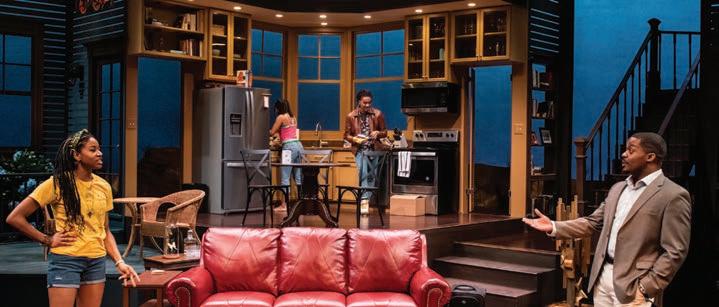
FEBRUARY 27, 2020 - CHICAGO READER 17
R READER RECOMMENDED b ALL AGES F
@marndel7 THEATER SEASON SPONSOR 847-242-6000 I WRITERSTHEATRE.ORG NOW PLAYING “Stick Fly TAKES FLIGHT at Writers!” Chicago Reader “OUTSTANDING! Fast-paced and meticulous.” PicksinSix “ VIGOROUSLY ENTERTAINING!” Chicago Sun-Times Pictured: Jennifer Latimore, Ayanna Bria Bakari, Eric Gerard and DiMonte Henning. Photo by Michael Brosilow.
REVIEW


 By KAYLEN RALPH
By KAYLEN RALPH
As one of three sisters, I feel uniquely qualified to review the chaotic choreography of dialogue that constitutes Plano, First Floor Theater’s presentation of the Chicago premiere of Will Arbery’s play, directed by Audrey Francis.
Plano is a story about Anne, Genevieve, and Isabel, three “sisters and friends” with a lot going on, thanks (or no thanks?) to the messy men in their lives: Juan, Steve, and God (represented as a “Faceless Ghost” and played by An-
drew Lund), respectively. The cadence of conversation between these three Catholic-raised sisters is slapdash but urgent in delivery, while solutions for what’s discussed are often put o until “later.” Life passes in a continuous, looping conversational style.
As anyone with sisters close in age will tell you, that’s how conversations amongst us go. You listen urgently because you care, but also because you’re perhaps waiting for your turn to talk. This dynamic, as demonstrated between Anne (Elizabeth Birnkrant), Genevieve (Ashley Neal), and Isabel (Amanda Fink), is so authentic that I felt myself getting anxious halfway through the performance, worried I’d perhaps
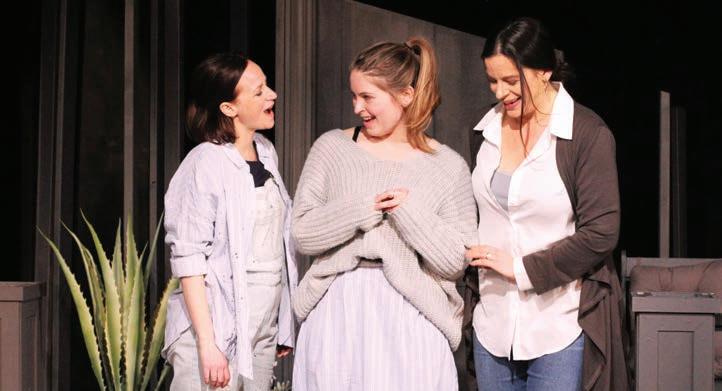
loop.
missed a ping from one of my own two sisters.
The Plano sisters’ updates about their lives, all delivered from Genevieve’s front porch, are stretched across space and time through smart staging and the telltale tones of their iPhones, the trill of FaceTime unmistakable (kudos to sound designer Eric Backus) as Anne and Genevieve check in with Isabel. She’s fled to Chicago to do the Lord’s work with women in need, while her two older sisters remain in Texas, worried about their husbands’ multiple personalities that haunt their homes and the streets of Plano. There is a sci-fi, futuristic, and impossible wash to this hypermodern production that works, despite its abject juxtaposition with the pastoral porch setting. There is strobe lighting, modern dance, and honky tonk.
“It’s later now,” is a constant refrain slipped into the run-on dialogue (fans of Gilmore Girls will love this production’s verbal rhythms), and that refrain is the only true marker of the passage of time. The sisters’ exchanges are productive insofar as they are cathartic—these sisters are close and they care for each other—but resolution is fraught, which I appreciated. You don’t need sisters to accept that life is messy and men are unmanageable, let alone multiples of the same disappointing husband. While none of the women are genuinely happy in their respective domestic scenarios (is anyone?), they are happy to have each other. v
@kaylenralph
18 CHICAGO READER - FEBRUARY 27, 2020 ll
Sister acts In Plano, three siblings share lives with messy men in an endless
R PLANO Through 3/28 : Thu-Sat 8 PM, Sun 3: 30 PM; also Mon 3/2, 3/ 16, and 3/23, 8 PM, Steppenwolf 1700 Theatre, 1700 N. Halsted, 312 335 1650, steppenwolf.org, $25 -$ 35, $20 students, $15 industry.
Plano GRACIE MEIER
100+ VENDORS 75+ SPEAKERS THE LARGEST CANNABIS CONVENTION FOCUSED ON ILLINOIS! necann.com/2020-illinois Contact ads@chicagoreader.com or call 312-392-2934 APRIL 3-4, 2020 THE CHICAGO HILTON, IL I C C LLINOIS ANNABIS ONVENTION THE
OPENING
A dog’s play
Dex & Abby is too inane to charm.
Normally, in a fantasy life, you obsess over your pets. Dog cloning figures largely in the mind anytime I think about how it would feel to be Barbra Streisand, personally. But there comes a point in any conversation with a decadent person—around hour two, perhaps—when you wonder if or when this fascinating individual will move on from dog talk and feed you dinner. That moment never comes in Dex & Abby, a 130-minute tepid fiasco, written by Allan Baker and directed by Daniel Washelesky.
Less a play than a live-action doggy-themed greeting card, this show imagines what it would be like if a rich gay couple, Sean and Corey, moved in together, and if their dogs, who can talk, took a while to become friends. Daniel Vaughn Manasia and Chesa Greene as the titular pooch duo can wag those behinds all they want: they’re dressed normally, their lines are inane garbage, and I just didn’t buy that they were dogs and neither did anybody else. Sure, they’re cute. But so is actual character development. So is costume design.
The overall weakness of the thing turns unsettling at times, as when Sean (Josh Pablo Szabo) tries to win an argument with Corey (Jesse Montoya) about whose experience of struggle is more valid by shouting pointblank into his partner’s face, “I’m a crack whore’s son!” Or when an inexplicable foldout bed emerges from the wall, stays in the scene for two quick and vapid cuddle scenes, then retracts once more, never to be seen again.
—MAX MALLER DEX & ABBY Through 3/29: Thu-Fri 7:30 PM, Sat 8 PM, Sun 2:30 PM, The Broadway at Pride Arts Center, 4139 N. Broadway, 800-737-0984, pridefilmsandplays.com, $40 premium reserved, $30 general reserved, $25 students and seniors (not valid Sat).



R Garden of unearthly delights
Actors Gymnasium’s winter show is not to be missed.
Actors Gymnasium primarily functions as a training school in the circus arts, but they put on a full-length show for an extended run every winter. And in the case of The Ghost in Gadsden’s Garden, you’d be a fool to miss it. A reclusive gardener, Gadsden (Adrian Danzig) spends his days tending the beautiful flowers on the grounds of an old (and allegedly haunted) mansion. And indeed, his interactions with the lovely ghost Vivian (Hayley Larson) provide the only semi-human contact he enjoys. But when Kid (Grace Sherman) creeps past the gate on a dare from classmates, they discover that Vivian may not be what Gadsden thinks.
With echoes of Oscar Wilde’s fable “The Selfish Giant” mixed with ecology lessons (Lucy Carapetyan plays Kid’s supportive science teacher), writers Chris Mathews (who also directs) and Sully Ratke incorporate the natural and supernatural with seamless aplomb.
I



Larson’s aerial work on the silks is particularly breathtaking, and Carapetyan joins with acrobatics creating clever physical metaphors for various scientific relationships, from symbiotic to parasitic. (Sylvia Hernandez-DiStasi created the circus interludes, with Kasey Foster choreographing dances to Kevin O’Donnell’s original sound and music.) The teen ensemble plays various impish garden flora and Kid’s Scooby Gang of tormentors-turned-allies with assured wit and charm. Danzig, cofounder of the beloved 500 Clown troupe, brings poignant charm to his lonely aging Gadsden. The entire show is a treat for the eyes and heart from beginning to end.
—KERRY REID THE GHOST IN GADSDEN’S
GARDEN Through 3/22: Fri 7:30 PM, Sat 4:30 and 7:30 PM, Sun 3 PM, Noyes Cultural Arts Center, 927 Noyes, Evanston, 847-328-2795, actorsgymnasium. com, $28, $18 students.

Factory explores the Rust Belt, karaoke-

FEBRUARY 27, 2020 - CHICAGO READER 19 THEATER
R Cleveland rocks
style.
guess a bad play could be written about the hostile overthrow of a Cleveland Heights karaoke bar at the hands of a hard-cider magnate named Ethan, whose Dex & Abby HEATHER MALL The Secret of My Success: A New Musical PARAMOUNT THEATRE at 23 E Galena Blvd in Aurora @ChicagoPlays #TheatreThursday MORE EVENTS: bit.ly/theatrethursday Take pride in the UNIQUE RISKY BOLD new work happening on Chicago stages year-round Theatre Thursdays is NEW every month! Join the Paramount Theatre for a pre-show reception with drinks and apps from 5:15-6:45PM in the Grand Gallery Lobby including a talk by a member of the production team. Then see the world premiere of the hilarious and heartfelt new musical The Secret of My Success at 7PM. Thursday, March 5 at 5:15pm Tickets are $40 with promo code LEAGUE (3/5 event + show) Buy Now: Paramountaurora.com or 630.896.6666 thursdays theatre BREAK THE ROUTINE with world premiere theatre ABOUT THE MUSICAL: After moving to New York City for his dream job, Brantley Foster finds himself in a sidesplitting scheme and assumes the identity of a rising executive. As he climbs the corporate ladder, Brantley falls in love and discovers that his definition of success might be all wrong. Will he get the job, win at love, or just get caught?
business card says, “purveyor of fine spirits and sophisticated settings.” I don’t see how, though. Some ideas are just too good. Regardless, Mike Beyer and Kirk Pynchon haven’t written that bad play. Factory Theater’s Last Night in Karaoke Town, directed by Kim Boler, is a fantastic play, one that gets to the heart of so many issues that matter, such as what varieties of taxidermy should be allowed in bars (squirrels? buffalo?), who gets to sing Natalie Imbruglia’s “Torn” when both Audrey and Lily claim it as “mine, bitch,” and whether the rusted-out factory your dad used to work in getting rebuilt as an REI is OK if you happen to like shopping at REI. You know, the important stuff.
The rainbow of die-hards hanging out at owner Diana’s joint could carry a production by themselves, so rife are they with quirks and infighting and opinions about Van Halen. And then you have Ethan, played by Tommy Bullington, who saunters in one fine day with his crates of pear cider and long black shawl to inform Diana (Wendy Hayne) that he’s bought the building and intends to refine its spirits and sophisticate its settings. What follows is a raucous showdown between the dual opposing forces of innovation and authenticity. I can’t say who wins. I can say that I laughed so hard at everything Bullington did that I thought I would be asked to leave the theater. —MAX MALLER LAST NIGHT IN KARAOKE TOWN Through 3/28: Fri-Sat 8 PM, Sun 3 PM, Factory Theater, 1623 W. Howard, 866-8114111, thefactorytheater.com, $25, $18 students and seniors.
R Love among the ruins
The cocreator of Russian Doll lands a masterpiece.
“I would let [insert name here] ruin my life” is a phrase that anyone who’s radiated their eyes with thirsty comments online over the past few years will recognize as a hallmark of the genre. What does it mean? If Dex (Michael Vizzi) and Shellie (Allison Plott) feel that way about each other in Leslye Headland’s The Layover—a total masterpiece, ultimately just as devastating as it is hot—presented by The Comrades under Drew Shirley’s direction, as I contend they do, what does that feeling entail? Is it a disease? Is that, heaven help us, what love is now?
If I would let you ruin my life, I’m obviously looking for trouble already. Dex’s engagement to Andrea (Emma Jo Boyden) is over the second he sits down with Shellie at the bar in O’Hare a er their Thanksgiving flight gets cancelled. You get the sense he would have let anyone ruin his life, given half the chance. Shellie’s life is practically in ruins already—she’s the full-time caregiver to an epileptic father (the amazing Jim Morley), unhappily married, tied down in every sense. She’s got a fair bit of one of Headland’s other protagonists in her: Natasha Lyonne’s character in the Netflix series Russian Doll, which Headland cocreated with Lyonne and Amy Poehler.
Dex, Shellie, and Lyonne’s Nadia Vulvokov are all alike—deacons in the church of “ruin my life.” But crack that pained thought open, and you see what it really is saying: I would let you kindle these dead nerve endings again. I would let you see if I’m still here —MAX MALLER
THE LAYOVER Through 3/22: Thu-Sat 7:30 PM, Sun 2:30 PM, Greenhouse Theater Center, 2257 N. Lincoln, 773-404-7336, greenhousetheater.org, $20.
R The elephant’s graveyard Mlima’s Tale shows the costs of the ivory trade.
This Lynn Nottage drama is pure kinetic energy, exploring the illicit ivory trade through the haunting death of Mlima, an African elephant. Griffin Theatre Company’s production, a midwest premiere directed by Jerrell L. Henderson, thrives on its use of movement, sound, and staging to illustrate our shared complicity in the poaching of a vulnerable species. Mlima, whose name means “mountain” in Swahili, is played by a mostly silent David Goodloe, who looms large, literally, over the entire 90 minutes. He’s the show’s emotional canvas, employing ethereal, athletic movements and an intense, textured gaze that as reads both accusatory and mournful. As Mlima’s tusks become increasingly objectified, Goodloe turns his body into a floppy piece of meat, resigned and exhausted.
A tight, propulsive story, this production leverages a capable ensemble of six to bring to life the entire chain of events from Mlima’s death in Kenya to the unveiling of an ivory carving in the home of a wealthy collector across the world. By bringing so many people and geog-
The Secret of My Success LIZ LAUREN
raphies under the tent of this shameful practice, from police to park rangers to government officials to pilots, Nottage makes the world a bit smaller and the tragedy less abstract. As does her insertion of well-researched and disturbing facts, like poachers using tourists’ safari photos on social media to locate their prey. A er absorbing the question an ivory dealer asks a collector—What price are you willing to pay for beauty?—you’ll walk away questioning the provenance and unknown costs of any rare valuables you possess. —MARISSA OBERLANDER MLIMA’S TALE Through 3/21: Thu-Sat 7:30 PM, Sun 3 PM; also Mon 3/16, 7:30 PM, Raven Theatre, 6157 N. Clark, 866-811-4111, griffintheatre. com, $38, $33 students, seniors, and veterans.
Death Potion No. 9
Poison tells the story of lethal women.
In 2013, Pulitzer Prize-winning journalist Deborah Blum wrote an article for Wired magazine titled “The Imperfect Myth of the Female Poisoner” that dispelled the persistent cultural assumption that, as far as murder methods go, homicides-by-poisoning are inherently ladylike. “It’s not, you see, that poison is a woman’s weapon,” says Blum. “It’s that it is an evil one.” And yet, dubiously sourced in historical criminology as they may be, there’s something wickedly satisfying and elegantly badass about artistic depictions of women dispensing revenge with perfume-like vials of death.
In that respect, in this 90-minute dark dramedy set in 17th century Paris, playwright Dusty Wilson has his cake and eats it too, indulging in a fantasy of outlaw women paving their own way while also wrestling with the gender and class-based roles that permit justice for some while dooming others. A talented chemist (Carina Lastimosa) and her tarot-card-reading lover (Lynnette Li) create a cottage industry helping wealthy women murder their plutocrat husbands. Christina Casano’s production for The Plagiarists keeps the grisly consequences of its protagonists’ actions at arm’s length for the most part, focusing instead on their justifications and nights spent spritzing toxic plants in a sparse but romantic hamlet tucked on the outskirts of society. A framing device featuring an interrogator (Bryan Breau) doesn’t quite reach the emotional contrasts Casano and company seem to be aiming for, but there’s some decent fun to be had with a flamboyant rival poisoner (Julia Stemper) and a naive woman of leisure (Brittani Yawn).
—DAN JAKES POISON Through 3/14: Thu-Fri 8 PM, Sat 2 and 8 PM; also Mon 3/2 and 3/9, 8 PM (industry performances), Berger Park Cultural Center, 6205 N. Sheridan, theplagiarists.org, pay what you can.
R Carry that weight
The a ermath of a police shooting shatters a picture-book marriage.
Ruby (Brooke Reams) and Wilson (Kevin Tre’Von Patterson) seem to have a picture-book marriage. While their daughter is away at summer camp, they plan on trying for another baby. But when Ruby’s best friend, Claire (Deveon Bromby), comes to stay a few weeks while recovering from the loss of a husband shot by a white cop, the couple’s seemingly blissful existence is shattered.
Christopher Burris directs this midwest Redtwist premiere of Rabbit Summer, Tracey Conyer Lee’s tense,
funny, and angry 2018 relationship drama, which, rather than shying away from facing some of the most complex and systemic issues plaguing this country, takes them all head-on. When it’s not dealing with gun violence, it’s addressing racism; then, for a breather, it tackles infidelity, abortion, and absent fathers. In less-capable hands, this material would have sunk under its own weight, but Lee has fashioned three characters who can pick it up, li it, and keep going. It is a testament to these three talented actors that no matter how heavy the message they’re tasked with delivering, I never felt for a moment that they were less than fully-formed human beings rather than conduits for information.
Wilson’s prized chifforobe—passed down for generations and used at one time to shelter runaway slaves in its false backing—is the central metaphor and physical manifestation of the warring forces facing African Americans in this country. It conceals as much as it reveals. It carries a weighty load, but with its doors flung open is ready to take on whatever comes.
—DMITRY SAMAROV RABBIT SUMMER Through 3/22: Thu-Sat 7:30 PM, Sun 3 PM; also Mon 3/2, 7:30 PM (industry), and Tue 3/10, 7:30 PM (understudy), Redtwist Theatre, 1044 W. Bryn Mawr, 773-728-7529, redtwist.org, $35-$40, $5 off for students and seniors.
Not so successful
A Michael J. Fox 1980s film gets a cliched musical makeover
This musical version of the 1987 Michael J. Fox vehicle, receiving its world premiere at the Paramount Theatre in Aurora, tells a sweet, lighthearted story—plucky young man climbs the ladder of success from mail room to executive suite—that feels a lot like an updated version of Frank Loesser’s 1961 Broadway hit How to Succeed in Business Without Really Trying, only without the bite or wit or heart. Where How to Succeed at least attempted to satirize American corporate culture (and largely fell short), The Secret of My Success is content to tell a story that would barely sustain one episode in a sitcom. Even though the story touches on some of the more devastating aspects of contemporary business (layoffs, plant closings, kleptocratic leadership), the show remains relatively toothless.
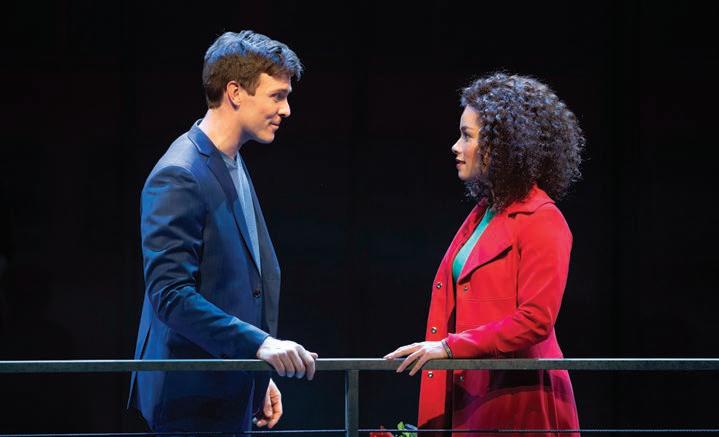
Part of the problem is the show’s bland, cliche-filled book by Gordon Greenberg (who also directs) and Steve Rosen. You just can’t tell an interesting story if you are content to give us, without irony, a show full of stock characters and predictable plot twists. The show’s forgettable score, by Michael Mahler and Alan Schmuckler, is less shallow than the book, though at times the songs o en feel like pastiches of better-known pop tunes of the last 50 years. Still, the tunes are ear pleasing, and the lyrics are frequently playful and witty.
A larger problem though is that the show’s story and message—the vanity of success, the importance of integrity and love—is too intimate for the big stage, and gets lost in all the singing and dancing and general Broadway glitz. Heidi Kettenring and Sydney Morton, as the two major female characters in the show, do a great job bringing heart and fire to the show. But Billy Harrigan Tighe brings no heat to his portrayal of the lead; again and again we found ourselves yearning for Michael J. Fox’s sly Alex Keatonish charm. —JACK HELBIG THE SECRET OF MY SUCCESS Through 3/29: Wed 1:30 and 7 PM, Thu 7 PM, Fri 8 PM, Sat 3 and 8 PM, Sun 1 and 5:30 PM, Paramount Theatre, 23 E. Galena Blvd., Aurora, 630-896-6666, paramountaurora. com, $36-$74. v
20 CHICAGO READER - FEBRUARY 27, 2020 ll THEATER
Kantemir Balagov solidifies his signature style with Beanpole
By KATHLEEN SACHS
Several minutes into Kantemir Balagov’s first feature, Closeness (2017), the young director makes himself known. “My name is Kantemir Balagov,” reads an onscreen text. “I am a Kabardian.” Set in Balagov’s hometown of Nalchik, the capital of the North Caucasus republic of Kabardino-Balkaria where the film’s real-life events took place, Closeness follows the family of a young Jewish man who gets kidnapped and held for ransom against the run-up to the Second Chechen War. The film has little in common plot-wise with Balagov’s second feature, Beanpole. Still, I was reminded of Balagov’s rather bold decision to start his debut feature with that personal declaration—a new, young talent (he was then, and is still, in his mid-20s) introducing himself to the world.
Balagov’s sophomore e ort secures his place as an endeavoring auteur. Inspired by Nobel laureate Svetlana Alexievich’s 1985 oral history of Russian women who fought during World War II, The Unwomanly Face of War (which Balagov read while studying under Russian filmmaker Alexander Sokurov), Beanpole , cowritten by Balagov and Aleksandr Terekhov, continues the former’s speculative and near-sociological examination of contiguous su ering. Closeness focuses on the sister of the kidnapping victim, while Beanpole centers around two young women soldiers in the aftermath of World War II. These aren’t mere character studies, however; what’s on the surface—those
cinematic qualities of image and sound—are just as integral as the protagonists’ inner lives.
Set in Leningrad in the fall of 1945, following the end of the war, the film considers the fraught relationship between the titular Beanpole, Iya (newcomer Viktoria Miroshnichenko, a singular presence), and Masha (Vasilisa Perelygina, a similarly beguiling newcomer), both of whom were among the 800,000 women who served in the Soviet Armed Forces during World War II. Beanpole opens with a medium close-up of Iya, frozen, while women around her go about their daily business. Someone attempts to rouse her; the camera pulls back to reveal her towering height in comparison to the other women—hence the nickname “Beanpole,” which, in Russian, also means clumsy, a descriptor Balagov has said represents a postwar state of physical and mental unease. At the beginning, Iya is shown to be a nurse in a veteran’s hospital, taking care of Pashka, a young boy who seems to be her son. But after she accidentally smothers him during a freezing fit, Masha comes back from the front, and we learn that Pashka was actually hers.
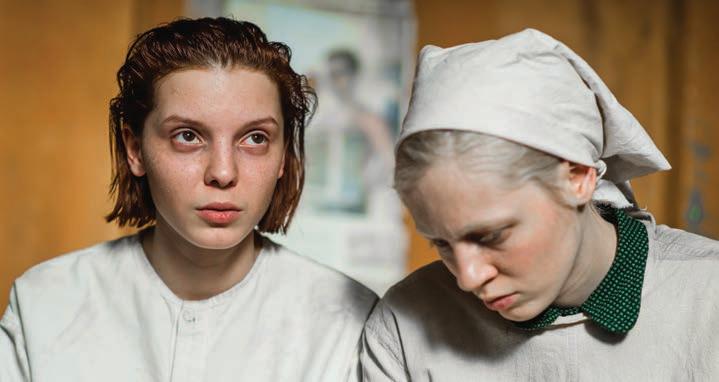
It speaks to the atrocities of war and its aftermath—and Balagov’s distinctive handling of it—that the boy’s death is not the catalyst for a pronounced, guilt-ridden breakdown between the two women, but rather the impetus of an odd codependent relationship, born of immense su ering, that the filmmakers don’t
exploit for cinematic tension. This sets the tone for the rest of the film, which, in addition to handling the protagonists’ trauma, reveals the su ering of those around them. All this manifests in Masha’s frenzied desire to have another child, which she convinces Iya to bear for her because she’s now unable to conceive due to injuries sustained during the war. Masha’s desire for new life and Iya’s awkward desire to “master” Masha, as she admits later in the film (an inclination that could be viewed as a warped romantic overture), speak to how each is processing her respective trauma.
The story is compounded by Balagov’s imposing visual aesthetic, which was evident in Closeness but here is on a whole new level. The striking mise-en-scène features intimate handheld camerawork, sullen long takes, bold lighting, and bright, painterly colors, specifically red (which signifies blood and death) and green (which signifies life). But above these aspects, I most admire how Balagov captures the characters’ physicality, from Iya’s freezing fits
throughout the film to Masha’s manic twirling during a particularly intense scene; the latter moment recalls one from Closeness, in which its female protagonist, feeling frustrated, dances wildly in a nightclub. More minute actions, like Iya’s hands on a dying soldier’s neck or Masha’s elusive smiles, often framed in visceral close-up, draw one into the intimacies of their being; that both women are played by first-time actresses is extraordinary.
It’s these vagaries that di erentiate Balagov from filmmakers who use such idiosyncrasies in an almost gimmicky fashion. Contrary to the marketing for the film—such as a teaser trailer that combines certain scenes and sounds in a misleading way—Balagov is not mining the scenario for its inherent weirdness. It’s there, to be sure, but it’s not meant to shock or awe. Nor is the film overtly political—there are oblique references to communism, but there’s no mention of Stalin. If anything, it’s rather plaintive and unequivocal, the anomalies of life after trauma. “My name is Kantemir Balagov,” I can almost see on the screen, this time at the end of the film. “And it’s as straightforward as this.” v

FEBRUARY 27, 2020 - CHICAGO READER 21 FILM
Beanpole REVIEW
The Russian filmmaker’s second feature explores the atrocities of war.
BEANPOLE sss Dir. Kantemir Balagov, 138 min. Playing 2/28 -3/5, Gene Siskel Film Center
Are
NOW PLAYING Brahms: The Boy II
The Boy is back in town. And, oh, how we missed Brahms, the porcelain doll with a wardrobe so dandy he’s able to coax Liza (Katie Holmes) and Sean (Owain Yeoman) into letting their son Jude (Christopher Convery) keep him. This is, of course, a huge mistake, which they may have realized if they considered sooner that Brahms was found in a shallow grave outside a dilapidated estate watched over by creepy caretaker Joseph (Ralph Ineson). Shit inevitably gets weird, working its way to a supernatural crescendo that unfortunately erases the ingenious twist of the third act from 2016’s The Boy. What the film’s director William Brent Bell and writer Stacey Menear do get right, however, is Brahms’s ability to endear himself to those around him. Wait to stream the sequel, but know it’s in preparation for what’s gearing up to become a full-blown franchise, which promises to give the people what they want— more Brahms. —BECCA JAMES PG-13, 86 min. Now playing in wide release
R Compensation

Shot on the cheap in Evanston and Chicago, this 1999 drama by Zeinabu Irene Davis manages to surmount its budget limitations through the beauty and symmetry of its narrative. In the early 20th century a deaf black woman (Michelle A. Banks) struggles to overcome the three strikes against her, even as she falls for a hearing but illiterate stockyard worker (John Earl Jelks); interspersed with this tale, and starring the same actors, is a modern story about another deaf black woman and her hearing boyfriend. Davis shoots in black-and-white, using archival photos to establish the turn-of-the-century setting, but they’re so evocatively deployed that you might forget they’re a money-saving device. The storytelling is pointedly visual, modeled a er the silent cinema, and the resulting purity of emotion elevates even the modern-day love story. —J.R. JONES 92 min. Thu 2/27, 7 PM. Block Museum of Art
R Daisies
My favorite Czech film, and surely one of the most exhilarating stylistic and psychedelic eruptions of the 60s, this madcap and aggressive feminist farce by Vera Chytilova explodes in any number of directions. Two uninhibited young women named Marie engage in escapades that add up to less a plot than to a string of outrageous set pieces, including several antiphallic gags and a free-for-all with fancy food (rivaling Laurel and Hardy) that got Chytilova in lots of trouble with the authorities; disturbing yet liberating, it shows what this talented director can do with freedom. A major influence on Jacques Rivette’s Celine and Julie Go Boating, this 1966 feature is chock-full of female giggling, which might be interpreted in context as the laughter of Medusa: subversive, bracing, energizing, and rather challenging to most male spectators. In Czech with subtitles. —JONATHAN ROSENBAUM 74 min. Tue 3/3-Thu 3/5, 10:30 PM. Logan Theatre
Fantasy Island
An interesting premise goes to waste in Blumhouse’s horror reimagining of the 1977 television series, Fantasy Island. This adaptation keeps the bones of the original: strangers arrive at a mysterious island run by Mr. Roarke (Michael Peña) where they’re told that their wildest fantasies will be brought to life, but as each fantasy begins, they quickly realize that some dreams
Get showtimes and see reviews of everything playing this week at chicagoreader.com/movies
are better le unfulfilled. The problem with Fantasy Island is that it can’t commit. It has scary moments, but they’re not scary enough to be horror. It has jokes (most of which are told by two of the only interesting characters: Jimmy O. Yang as Brax Weaver/Tattoo and Ryan Hansen as J. D. Weaver), but it’s not funny enough to be a comedy. There is magic, but we’re led to believe this isn’t magic even though the story makes no sense in reality. Even the fantasies of each character don’t quite add up. The concept of wish fulfillment is a compelling one, but the film blows past an opportunity to explore that. By its end, Fantasy Island is just another cautionary tale against remakes. —NOËLLE D. LILLEY PG-13, 109 min. Now playing in wide release
R We Are Not Princesses

In most productions of Sophocles’s Antigone, the tragedy is blunted by the distance of millennia. The bridge between the seats of a contemporary theater and the landscape where Antigone is murdered by a tyrannical king is thousands of years long. But the shimmering, fascinating, inherently dramatic documentary We Are Not Princesses, about Syrian refugee women rehearsing Antigone, closes that distance. Directors Bridgette Auger and Itab Azzamby take viewers through rehearsals unfolding within a Beirut refugee camp, using the play to explore the stark parallels between Sophocles’s tragedy and the refugees’ experiences. Antigone defied King Creon by burying her rebel brother, despite the king’s order that he be le to rot in the streets. For the cast members, there’s nothing distant or metaphorical about Antigone’s predicament.
“We don’t know if their bodies have been eaten by dogs or what,” says one woman of loved ones lost to the Syrian war, their bodies le to rot, unburied, where they fell. For another cast member, Antigone’s imprisonment and erasure evokes memories of being married as a child and then imprisoned at home for losing her face veil. A third woman raps about fleeing Syria in high heels, weeping in pain as she ran. Gorgeous animation sequences (by Pedro Allevato) are used to protect the identities of cast members who could face brutal punishments if recognized on screen. The haunting images seem to capture the intersection between body and spirit as Antigone comes to life. We don’t learn much about the organization leading rehearsals, which is fitting. We Are Not Princesses belongs to the women immersed in Antigone, and bears witness to their epic journeys.
—CATEY SULLIVAN 74 min. Sat 2/29, 7 PM. Chicago Filmmakers
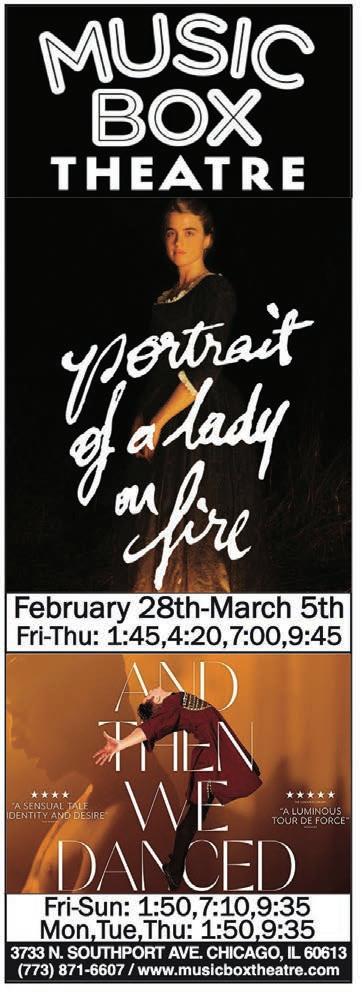
ALSO PLAYING
JCC Chicago Jewish Film Festival
The annual festival returns with more than 50 films featuring Jewish filmmakers, writers, and actors screening over three weekends in multiple venues including Logan Theatre, Century 12 Evanston/CineArts 6, Landmark Renaissance Place Cinema in Highland Park, and the Illinois Holocaust Museum & Education Center. For all venues and full schedule of screenings visit jccfilmfest.org. 2/28-3/15. Various venues
Present.Perfect
SAIC grad Shengze Zhu directed this documentary about the Internet livestreaming phenomenon in China, with a focus on more marginal individuals than those who have become celebrities. In Mandarin with subtitles. 124 min. Zhu attends the screening. Fri 2/28, 7 PM. Block Museum of Art v
22 CHICAGO READER - FEBRUARY 27, 2020 ll FILM We
Not
Princesses
R READER RECOMMENDED b ALL AGES N NEW F
Find hundreds of Readerrecommended restaurants, exclusive video features, and sign up for weekly news at chicagoreader.com/ food.


















FEBRUARY 27, 2020 - CHICAGO READER 23 SIFU師父 UCHICAGOGlobal An Evening of Cantonese Opera Tue, Mar 17 • 7pm / Performance Hall Pre-show talk at 6:30pm; reception following performance The tradition of Cantonese opera, with its vivid costumes, distinctive music, and dramatic presentation, has been fostered and developed for over 500 years. Since its inception, this living practice has been carried on by sifu, experienced performers and masters of the form fluent in the narratives of myth and history. For one performance only, opera sifu will present a collection of these canonical stories through martial arts, acrobatics, acting, and singing, accompanied by traditional Chinese percussion. LOGAN CENTER FOR THE ARTS 915 E 60TH ST Free parking Mon–Fri after 4pm loganUChicago TICKETS bit.ly/sifu_opera General $25; Seniors $10 ; Students and children 5 & under $5
Music is for every body
Chicago’s concert venues have made welcome advances in accessibility, but a regulatory gray area lets them fall short of what they should be.
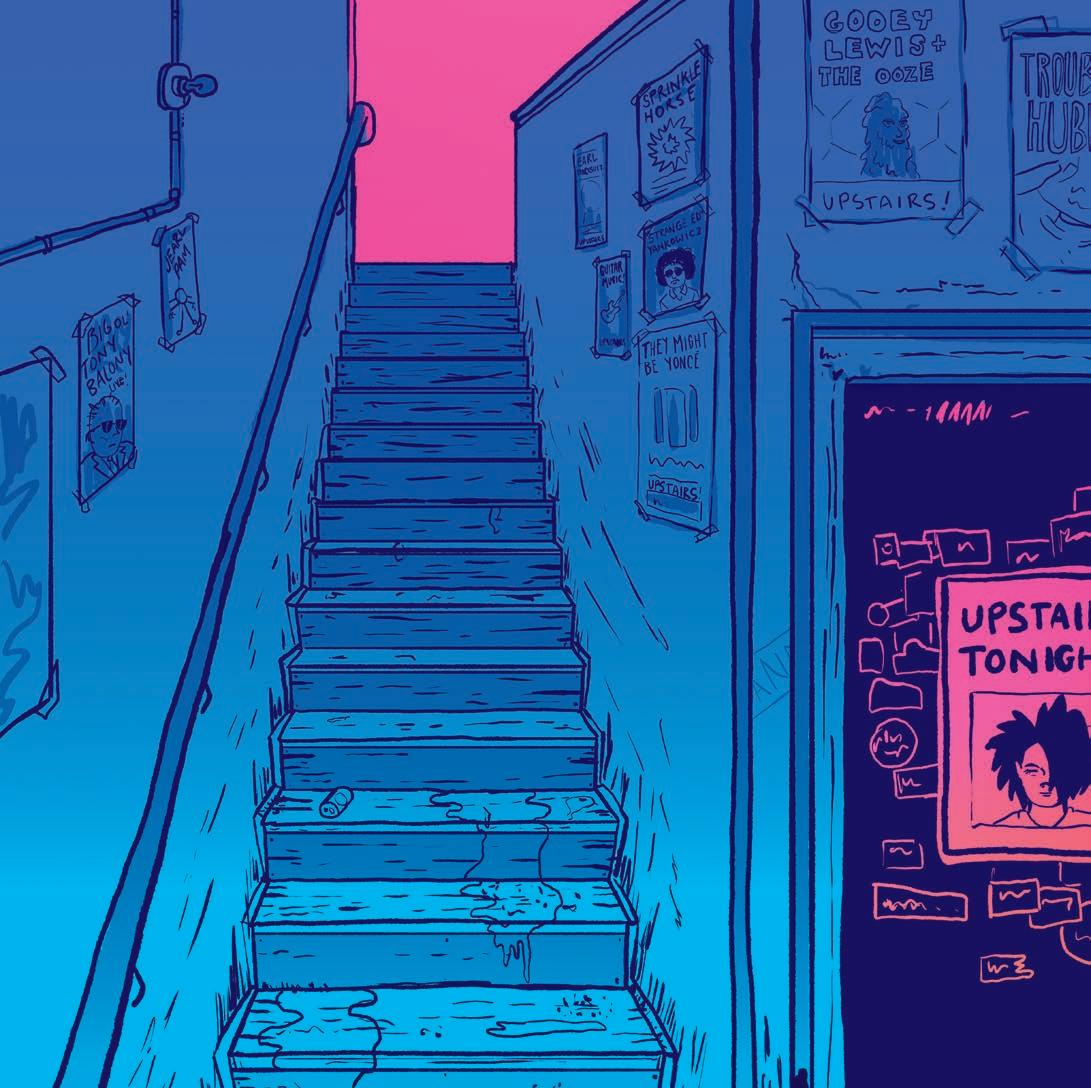 By BRIAN O’DONNELL
By BRIAN O’DONNELL
Almost ten years ago, I was offered a free ticket to see New Orleans rapper Curren$y and Chicago duo the Cool Kids at Metro. I remember
two details from the show: the harrowing experience of having my wheelchair pushed up two flights of stairs to the theater, then lowered back down in a process that was somehow even more grueling and scary, and
the fact that Curren$y gave me a T-shirt. I go to lots of concerts, but this one stands out—and not for good reasons. First was the venue, which I’d been assured would be fully equipped to handle a person in a wheel-
chair, and second was that free shirt, which I promptly lost.
I still haven’t made another trip to Metro, and even now I think about that concert. I probably wouldn’t have attended without the free ticket (nothing against the artists—I just didn’t know them well), and in retrospect I’m thankful I wasn’t hugely into it. If I’d had even a marginally better time, I’d have risked it on the Metro steps again.
The Chicago live-music scene is a defining feature of the city’s cultural landscape. It’s a wide, diverse, and inclusive space, and over the decades it’s been opened up to more and more voices and audiences—people who were once locked out of the social conversation surrounding music or even locked out of the business of making and performing it publicly. But while it’s certainly good news that the willingness to accept diversity is no longer an overriding concern, the question remains: Is the scene inclusive of everyone? When it comes to accessibility for people with disabilities, the short answer is “It’s complicated.” The long answer is “It’s really complicated.”
When the Americans With Disabilities Act passed in 1990, people with disabilities were supposed to be granted an unprecedented level of access, not only to civil rights but also to public spaces and the social inclusion they o er. Language to this e ect appears in every version of the act, from the 1990 original through the 2015 amendment, as well as in the disability section of the 2017 Chicago Human Rights Ordinance, which regulates accessibility in public spaces (more on that in a moment). This repetition is key, because it indicates that the legislators involved understood the importance of public spaces. Consider the other primary areas covered under ADA, such as employment, education, housing, and access to justice. Access to public spaces is on the same level—people with disabilities must be able to fully participate in culture and commerce in order to integrate themselves into modern life.
The ADA will turn 30 on July 26, 2020, and during its history tremendous strides have been made for those with disabilities—for an example, look no further than Tammy Duckworth’s service in the Senate. At a micro level, the signs of progress are all around, in the ubiquity of basic access features such as curb cuts and braille signage. It’s getting better every day, but as with all avenues of
24 CHICAGO READER - FEBRUARY 27, 2020 ll
FRANK
OKAY
social progress, the more things improve, the more glaring the remaining failures become. Given that Chicago’s live-music scene is so thoroughly enmeshed with the city’s sociocultural past, present, and future, it’s as good a lens as any through which to examine the remaining gaps in access.
Section 600 of the 2017 Chicago Human Rights Ordinance is the most applicable legal standard for music venues—in its own words, its intent is to “implement the disability rights provisions.” Music venues are covered as public accommodations or commercial spaces and thus prohibited from discriminating against those with disabilities (section 600.202a). This includes but is not limited to providing physical access to venues, separate ticketing, accommodations for service animals, and, most relevant, the removal of barriers when necessary.
Among the accommodations covered are installing ramps, repositioning shelves, lowering buttons, and including braille translations (600.304). These modifications are


required if a covered structure was built after December 31, 2016 (600.401), and if a building predates the 2017 code, then any alterations after December 31, 2016, must accommodate access to the “maximum extent feasible” (600.402). This includes adding elevators to buildings taller than three stories or exceeding 1,000 square feet of usable space, excluding areas such as storage closets (600.404).
The “maximum extent feasible“ standard applies broadly, though, and there’s also an overarching exception that lets businesses o the hook if accommodations would impose an outsize cost or other “undue burden.” To adjudicate claims, the city takes into account factors such as fi nancial resources and total number of employees.
At this point, the complexity of the issue should be more clear. Yes, public spaces are required to make accommodations for people with disabilities, but the extent of such accommodations can be debated from all sorts of angles, and the diversity within the disability community makes access an ever-evolving
standard. So let’s step outside the legal framework and look at the practical realities of engaging with the Chicago music scene. What’s it like to actually go to shows with a disability—in my case, using a wheelchair?
I try to average a show a week, and that takes me all across the city and to all sizes and types of venues. If you do anything enough times, you start to pick up on patterns—and for me, those patterns mostly involve access. Why is this venue easier to go to than that one? How does the accessibility here affect how I need to plan my night? Why do acts I like keep playing Metro?
I’ve assessed a few prominent venues in terms of accessibility. I’ll default to legal standards only when necessary—I prefer to simply try to tell you what a night at a show looks like for me. I can only speak to my specific experiences, of course, and how they relate to my specific condition—which means I’ll be talking about mobility and wheelchair accessibility. People with other conditions may find some parallels, as may those without

disabilities who are simply a ected in their own way by the physical realities of a venue.


ARAGON BALLROOM
1106 W. Lawrence
The Aragon regularly plays host to touring acts just a step below those who can confidently book the United Center or Allstate Arena. It’s a magnificent space, with a gorgeous interior facade, and the great musicians it attracts make it nearly unavoidable.


From an accessibility standpoint, the Aragon technically has everything, but it also has fundamental flaws that create complications.
The accessible section is on the third-floor balcony, but the bathrooms (a crucial part of any night out!) are on the fi rst fl oor. The elevator is a rickety old relic that barely fits a single wheelchair, so getting to and from the accessible section—which is spacious, with excellent sight lines—is an ordeal.
The Aragon, like every venue I discuss here, has fulfilled its legal obligations. But on a practical level, can access be considered
FEBRUARY 27, 2020 - CHICAGO READER 25
MUSIC
1200 W
RANDOLPH
ST, CHICAGO, IL 60607 | 312.733.WINELIVE MUSIC IN URBAN WINE COUNTRY mar marfeb mar 3 294 9 The Ides of March feat. Jim Peterik Drew Emmitt & Vince Herman of Leftover Salmon
Jack Broadbent with benjamin jaffe
DON’T MISS... UPCOMING SHOWS 3.1 Corky Siegel’s Chamber Blues FEAT. ERNIE WATTS AND GORAN IVANOVIC 3.2 Play On feat. Marquis Hill MERIT SCHOOL OF MUSIC BENEFIT 3.8 We Banjo 3 3.10Ana Popovic 3.11 Kasim Sulton’s Utopia 3.13 Squirrel Nut Zippers 3.17Lady Lamb AN EVENING WITH STRINGS 3.18-19 Alejandro Escovedo FEAT. DON ANTONIO & ALEX RUIZ 3.20-22Eric Roberson 3.22 Chicago Philharmonic Brunch STRINGS, SYRAH, & SISTERHOOD 3.23 Peter Collins 3.5+6 COWBOY JUNKIES 3.14-16 SINEAD O’CONNOR 3.24 TOM WEST 3.25 BOBBY V 3.26 DAVE SIMONETT OF TRAMPLED BY TURTLES WITH ANDREA VON KAMPEN 3.27 MOMS & MURDER LIVE PODCAST 3.28 RODNEY CROWELL 3.29 CHICAGO SOUL SPECTACULAR 3.30 VOICES OF CHICAGO: MUSICAL DIVERSITY IN THE WINDY CITY 3.31 AL JARDINE (OF THE BEACH BOYS) 4.1 THE DAVE HOLLIS BOOK TOUR 4.2 THE STEELDRIVERS 4.3-4 LYFE JENNINGS 4.5-6 VANESSA CARLTON WITH JENNY O. 4.7 SHAWN MULLINS 4.8 CAROLINE STANBURY 4.9 THE JAMES HUNTER SIX 4.10-11 RAHEEM DEVAUGHN 4.12-13 SHEILA E. AND THE E-TRAIN 4.15-16 JAMESTOWN REVIVAL Cyrille Aimee
MUSIC
equal when my experience is so much more complicated? This is a small issue, but it illuminates the gap between the goal of accessibility regulations and the real-world result.
part-time venues, where you can find some of the most interesting underground or up-andcoming acts. Of course, house and basement shows are great for that sort of thing too, but most DIY venues are outside the scope of this discussion—private residences aren’t covered under the regulations outlined above. Galleries and similar converted spaces are still commercial businesses, though, and thus subject to the code.
While Co-Pro appears inaccessible, with two steps to enter, the sta have ramps for each landing that they’ll bring out. They’re not specialized pieces of equipment—you can get them at Lowe’s or on Amazon for less than $200, and they’ll support nearly all wheelchairs. They’re basic, but they make all the di erence.
The space also has gender-neutral restrooms that remove another major barrier for visitors with disabilities. Gender-neutral restrooms are, in my experience, a godsend for people like me, who have larger pieces of medical equipment or require assistance. They allow for assistants of a di erent gender to help without awkwardness, and they’re usually larger than gender-specific bathrooms, with more maneuvering room. It’s a perfect example of how working to include one group can open the door to others.
BEAT KITCHEN
2100 W. Belmont
This throwback watering hole has surprisingly good food and a small venue in the back. The issue is with the bathrooms—they’re down a fl ight of steep stairs, and there’s no elevator. No getting around that.

CO-PROSPERITY SPHERE
3219 S. Morgan
This Bridgeport gallery, also the home base of Lumpen Radio and Lumpen magazine, hosts occasional concerts, including the annual Windy City Crash Pop Festival (in conjunction with Marz Brewing, another related enterprise). Co-Pro represents a class of hybrid or
The vast majority of venues can be made accessible, at least for entrance, with simple changes. It comes down to whether or not the people running them care to think about how they can include everyone. The Co-Prosperity Sphere puts in that thought. Lots of other venues that I don’t have the space to address in detail also do a fine job, among them Thalia Hall, Martyrs’, the Vic, Sleeping Village (though there’s no access to the edge of the stage), Schubas, and Bottom Lounge.
EMPTY BOTTlE
1035 N. Western
I need to declare my bias before I proceed. I love the Empty Bottle in a way that I doubt I’ll ever love a human person. In an increasingly homogeneous landscape, the Bottle is a glorious throwback to the days of dives. Low ceilings, low lighting, surprisingly expansive bar offerings, an outstanding calendar of local and national acts—this is the purest expression of Chicago’s no-bullshit musical aesthetic. The result is often a tightly packed crowd imbued with breathless energy, thanks to a blast-it-to-the-back-wall sound system
26 CHICAGO READER - FEBRUARY 27, 2020 ll
continued from 25
Is the scene inclusive of everyone? When it comes to accessibility for people with disabilities, the short answer is “It’s complicated.” The long answer is “It’s really complicated.”
that’s right at the end of your nose.

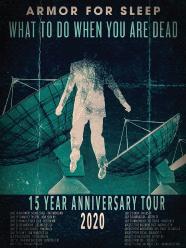

The Bottle is older, though, and like many older places, it has small bathrooms that make it prohibitively di cult for wheelchair users to have any privacy. You’ve either got to block the door somehow or use the restroom more or less in the open. While the statute requires bathroom access, changes to make this particular bathroom more accessible would involve at the very least knocking out part of a stall wall, which would be burdensome. Bottle owner Bruce Finkelman says the club plans to improve the accessibility of its
women’s room in 2020—possibly both restrooms, if its budget permits. He also stresses that the Bottle is eager to hear ideas from patrons about how it can be better about accessibility in other areas as well. The current situation at the Bottle, as with the location of the Aragon’s rest rooms, doesn’t so much exclude disabled people as make things more complicated for them—it’s one of the many challenges that remain in this twilight zone between regulation and reality.


I appreciate many things about the Bottle, but the standout feature is the staff. They
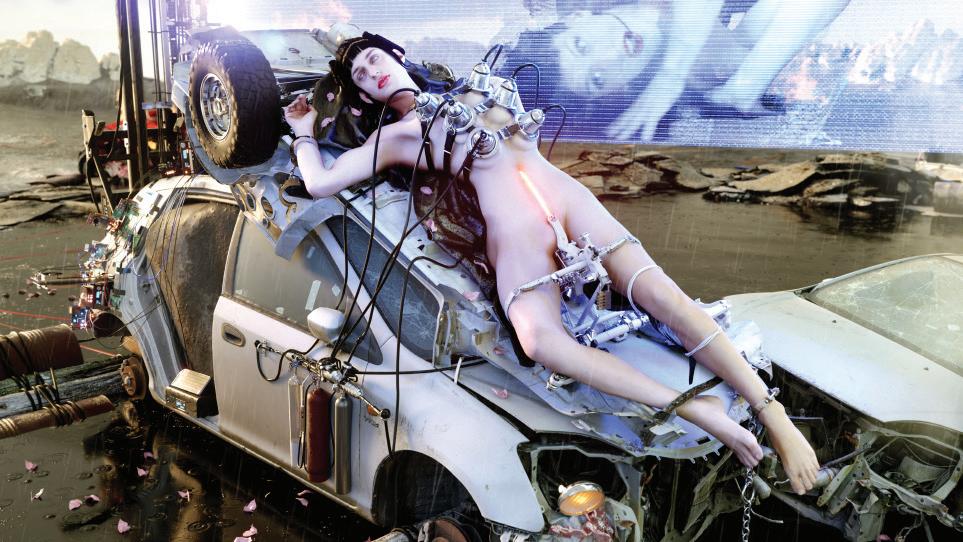

FEBRUARY 27, 2020 - CHICAGO READER 27
MUSIC SMARTBARCHICAGO.COM 3730 N CLARK ST | 21+ 3730 N. CLARK ST TICKETS AVAILABLE VIA METRO + SMARTBAR WEBSITES + METRO BOX OFFICE. NO SERVICE FEES AT BOX OFFICE! FRI MAR 06 ELLEN ALLIEN SHAUN J. WRIGHT What it is with... EOB WED MAY 27 ARMOR FOR SLEEP FRI AUG 14 NIGHTMARES ON WAX PRESENTS SMOKERS DELIGHT 25TH ANN. LIVE ORCHESTRA SHOW SAT APR 18
MUSIC
should be commended for the casual and, dare I say, normal way they treat guests with disabilities. The staffs at some venues are unsure or uncomfortable when dealing with guests with disabilities, but the Bottle’s aren’t—and as a bonus, many of them are also in good bands.
No venue is without its flaws, but some have more than others. Though the House of Blues has helpful staff and is generally accessible, it doesn’t allow wheelchairs on the main floor, and its accessible section has poor sight lines. SPACE in Evanston likewise has terrible sight lines for wheelchair users, unless you manage to get a seat. The Chicago Theatre, though it’s gorgeous from the marquee on down, has a lousy accessible section that makes for a di cult experience in such a big space. And then there’s Metro.
METRO
3730 N. Clark
Metro has been in business about a decade longer than the ADA has existed, and the
building it occupies went up in 1927. But judging by its level of accessibility, it hasn’t had to change a thing since the law went into e ect. To explain what going to a show there is like, it’s best to walk through it step by step.
The Wrigleyville landmark has a secondfloor concert hall that hosts an excellent and eclectic array of nationally recognizable acts. But to access that hall, you’ll need to negotiate two long fl ights of stairs and a two-step landing at the top.
To its credit, the venue understands that this might be a problem. It asks disabled people to get in touch in advance of a show: “Metro is always happy to accommodate patrons with special needs,” says owner and founder Joe Shanahan. “We ask that patrons e-mail with their name, nature of your special need, and date of the show at ask@metrochicago.com. Prior notice is preferable as it helps in preparation and to ensure we have sta ready to assist the patron in the enjoyment of the show.”
This request for prior notice implies there’s a solution in place for the room’s apparent
inaccessibility. The solution, unfortunately, is two ramps laid over those flights of stairs.
To clarify why this is a problem, I’ll do some math. The ADA has guidelines only for new ramps, which state that the maximum allowable slope is 1:12 (one inch of rise must have 12 inches of run), or about 4.8 degrees. Other organizations support this standard, though in my experience as a frequent ramp user, anything less than 15 degrees is fine. The average flight of stairs has an incline of 37 degrees. I haven’t measured the stairs at Metro, but even if they’re not as steep as they feel— even if they’re merely average—they’d still be well beyond the maximum slope allowed for a new ramp.
When you arrive to find these ramps, you’ll also fi nd Metro’s entire security team waiting to push you up the stairs one grueling, nerve-wracking inch at a time. This is inelegant and exhausting enough, but then they need to manually lift your chair up the final two steps. The trip down is every bit as harrowing, but you aren’t being pushed—on my wheelchair, I had to engage the motors by
tapping the joystick (which disengages the brakes) while sta ers slowly guided the chair down the ramps, stopping on each landing to catch their breaths. Having the motors engaged allowed the chair to roll but didn’t let it roll freely—if it had, I would’ve been little more than lots of dead weight falling fast, and those steps leave very little margin for error. My chair weighs three times what I do, and I don’t have the muscular support to manage an accident as opposed to just being crushed. Thankfully, on the day I went, the sta were incredibly capable and good natured.
Why is this allowed to continue? At this point, you can probably rattle off a list of loopholes that might apply. In this case, installing an elevator would probably be deemed prohibitively expensive, if not infeasible due to the building’s layout. A smaller venue wouldn’t be large enough to trigger the elevator requirement, and a building on the National Register of Historic Places (just as a for instance) would have its own exemptions.
Perhaps the most effective barrier to improving access is, ironically, the bureaucracy
-
-
-
-
-
-
-
-
-
-
-
-
-
-
-
-
-
-
-
-
-
-
-
-
-
-
-
-
-
-
-
-
-
-
-
-
-
28 CHICAGO READER - FEBRUARY 27, 2020 ll
continued from 27 JUST ANNOUNCED + UPCOMING= LINCOLN HALL = SCHUBAS 03/0403/0503/0503/0603/0703/0803/0903/1103/1203/1303/1303/1603/1703/1803/1903/2003/2003/2103/2103/2203/23TÉLÉPOPMUSIK [LIVE] AVIVA AMY WINEHOUSE TRIBUTE LUCKY CHOPS BEGONIA BILLY RAFFOUL LOWER DENS GLADIE ALLAH-LAS GASHI ADAM GREEN BLANKS BENDIGO FLETCHER ÁSGEIR COX N’ CRENDOR LIVE! ZOOFUNKYOU LITTLE PEOPLE FRAMEWORKS PALEHOUND VUNDABAR THE SONDER BOMBS THE BACKSEAT LOVERS 03/24-25
03/25
03/26
03/27
03/28
03/29
03/30
03/31
04/01
04/01
04/02
04/02
04/03
04/04
04/04
04/05
04/06
04/06
04/07
04/07
04/08
04/08
DEAFHEAVEN DOTAN VÉRITÉ EVAN GIIA YOUNG MAN IN A HURRY FAMILY GROOVE COMPANY KINDO ABERDEEN THE MURDER CAPITAL TOMM¥ €A$H DAN MANGAN DEEPER (RECORD RELEASE) CAROLINE ROSE DISQ BASIA BULAT BÜLOW MEG DONNELLY MC HOTDOG SQUIRREL FLOWER HOLY FUCK WINONA FOREVER GARZA (THIEVERY CORPORATION) 04/0904/0904/10-1104/1004/1204/13
04/14
04/14
04/15
04/16
04/16
04/17
04/18
04/18
04/20
04/22
04/23
04/23
04/24
04/24
JORDAN MACKAMPA FLORA CASH PAPADOSIO KEVIN KRAUTER YVES TUMOR ELLIS LOOTE OVERCOATS LILLY HIATT STEPHEN DAY TROPICAL FUCK STORM THE LIL SMOKIES (TWO SHOWS) NNAMDÏ (RECORD RELEASE) SHOFFY ROGER CLYNE ANDTHE PEACEMAKERS UNLADYLIKE BASSEL AND THE SUPERNATURALS THE BALLROOM THIEVES COSMO’S MIDNIGHT THE RESIDENTS TICKETS AND INFO AT WWW.LH-ST.COM LINCOLN HALL SCHUBAS TAVERN 2424 N LINCOLN AVE 3159 N SOUTHPORT AVE
MUSIC


designed to protect and uphold access. Not everyone can a ord to hire a lawyer and fi le a compliance claim, even though sometimes such a claim is the only way to push change. Chicago has a stellar reputation when it comes to accessibility and enforcement. But many aspects of accessibility can be defi ned as optional, depending on the circumstances (or whether you’re dealing with someone who sees nothing but the basic necessities for survival as worthy of mandatory protection). In those cases, the intransigence of bureaucracy becomes more of an issue.
Why would I spend time and money to figure out why Metro is like this? Or to deal with a grievance procedure that will simply confirm that the venue is already in compliance? I can just not go there—or adopt the mindset, only half in jest, that I’ll go strictly for shows that I’d be willing to die to see. I’m currently debating this for Drive-By Truckers, Dan Deacon, Pussy Riot, and AJJ. But as with so many other shows, they probably just won’t be worth the risk or the e ort.
That’s the real issue, isn’t it? If a venue is accessible to the standard of the law but still excludes certain people under certain circumstances, then for those people the venue is inaccessible. They’re kept out of the space, the experience, and the culture.

Also annoying is the fact that any time I spend discussing the nuances of regulation is time I can’t spend discussing music. I’d much rather tell you about all the wonderful experiences I’ve had at shows or festivals, or talk about Thalia Hall’s In the Round series, or really just address anything about the music. If I didn’t love it so much, I wouldn’t be here saying any of this.
It can feel confounding to try to solve the new access issues that have cropped up as old barriers were broken down, but I’m certainly not advocating defeatism—the first step is to see the issues. Take three seconds and ask yourself if a place is accessible for someone with a disability. Think about what that might entail, outside of “Are there steps?” (though don’t ignore that question either). Progress requires collective effort. You may have a solution or an opportunity that I don’t, or maybe you can see the situation in a di erent light. The ADA was put in place by a huge group of people working together, all contributing in any way they could, and it’ll surely take the same sort of e ort to fi x the rest of these issues.
Then we can get back to the music. v


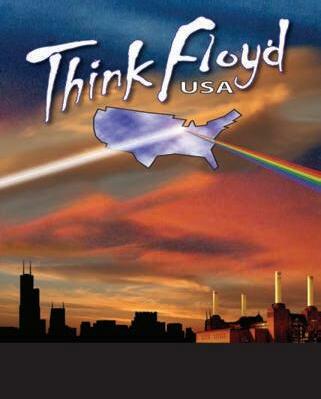


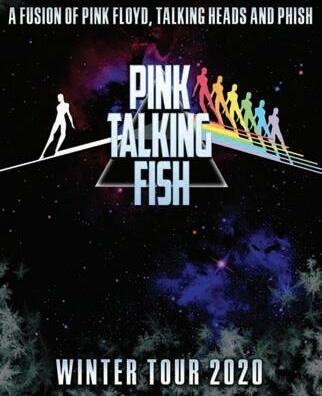
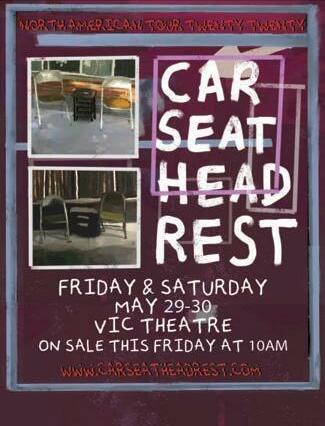

FEBRUARY 27, 2020 - CHICAGO READER 29
® BUY TICKETS AT SPECIAL GUESTS MARK HAYES This Saturday! February 29 Vic Theatre This Saturday! February 29 Park West SPECIAL GUESTS OLD SALT UNION Saturday, March 7 Vic Theatre Friday, March 6 Park West Saturday, March 14 • Park West On Sale This Friday at 10am! Saturday, June 13 Park West Saturday, March 7 Riviera Theatre with Special Guests
PICK
Pioneering
IN 1987 , British punk and postpunk pioneers Wire pulled an unforgettable power move: After a few years’ hiatus, the band reconvened and announced a comeback tour. However, they were only interested in their new electronic material and refused to perform any of their beloved early songs. So they booked a Wire tribute band, the Ex-Lion Tamers (which included Chicago music critic Jim DeRogatis), to open for them and play their iconic 1977 album Pink Flag in its entirety. Decades down the line, they’re not so reluctant to revisit their storied history. Wire’s second act (or is it third?) has been under way since 2003, when they regrouped with original drummer Robert Grey (aka Robert Gotobed) following a ten-year break. The new Mind Hive (Pink Flag) is their eighth album since then (and their 17th full-length altogether), and it showcases much of what still makes the band unlike any other. Even when the arrangements are full and rich (as on the Krautrock-ish “Hung” and the droney, dreamy “Unrepentant”), their songs retain a distinctive chill austerity. The dystopian stomp of “Be Like Them” and the understated horror story in “O the Beach” demonstrate that they haven’t lost their dark edges either—there’s an uneasiness lurking in every corner and in all 35 minutes. And this will continue to be a good year for Wire fans: not only is there a new album and tour, but the band are also collaborating with writer Graham Du and director Malcolm Boyle on a forthcoming crowdsourced documentary, People in a Film, that spans Wire’s entire career. Footage from the film—including the bandmates walking around a village, riding a tractor, and collaborating in the studio—can be seen in their video for “Cactused.” On this tour, Wire will also show o their DJ skills; a di erent member will spin an opening set each night.

—MONICA KENDRICK

THURSDAY27
Charles Curtis Part of the Frequency Festival. 7 PM, Art Institute of Chicago, Fullerton Hall, 111 S. Michigan, $5-$10. b
Though her work is o en characterized as minimalist, composer Éliane Radigue is a category unto herself. During the 1950s and ’60s, the Paris resident worked as an assistant to the originators of musique concrète, Pierre Schaeffer and Pierre Henry. But the music she composed after leaving their orbit employed long tones obtained from microphone feedback, tape loops, and synthesizers, and it’s both quiet and demanding; close listening is necessary to perceive the subtle shi s in tonal color that occur as these pitches gradually coalesce and disperse. Just a er the turn of the century, Radigue transitioned from playing electronics to composing for acoustic performers, and the first instrumentalist she chose was American cellist Charles Curtis. The essence of their first collaboration, Naldjorlak I (composed between 2005 and 2008), is the wolf tone, which occurs in stringed instruments when the resonant frequency of a bowed string and the resonant frequency of the instrument’s body interact with each other to create a new sound—usually a raw maelstrom of string and wood noise. Cellists generally do whatever they can to avoid wolf tones, but on Naldjorlak I, Curtis sustains and modulates them for three quarters of an hour, obtaining rich layers of rasping and resonance that are every bit as entrancing as Radigue’s electronics of yore. On Curtis’s three-CD survey Performances & Recordings 19982018, just released by the Saltern label, he exercises similar devotion to the diverse requirements of a piece by 17th-century Scottish composer Tobias Hume, another by 20th-century 12-tone composer Anton Webern, a Velvet Underground-steeped original named “Music for Awhile,” and a more recent Radigue composition. Curtis will return to Naldjorlak I for this Thursday concert, which is part of the Frequency Festival (booked by former Reader staffer Peter Margasak). The festival also presents performances of Radigue’s music by violist Julia Eckhardt and trumpeter Nate Wooley on Wednesday, February 26, in the Bond Chapel of Rockefeller Memorial Chapel. Curtis will make a nonfestival appearance at the Art Institute that same day, playing over prerecorded drones in response to the work on display in the Alsdorf Galleries of Indian Art.
—BILL MEYER
Chicago Flamenco Festival See also Friday and Saturday. Tonight’s program features a performance by La Chimi as well as presentations and an art opening. 5:30-8 PM, Instituto Cervantes, 31 W. Ohio, $100. b
Few forms of music and dance embody raw emotion as exquisitely as flamenco. This formidable and quintessentially Spanish art form fuses elements from Jewish, Arab, and Roma cultures and distills the essence of grief, tragedy, fear, and joy into every note, gesture, and stomp. Hosted principally by the Instituto Cervantes, the first half of the 18th annual Chicago Flamenco Festival (part two is promised this fall) consists of ten performances, an art exhibit, workshops, and a wine tasting over the course of

30 CHICAGO READER - FEBRUARY 27, 2020 ll
Wire Wed 3/4, 8 PM, Metro, 3730 N. Clark, $ 30, $25 in advance. 18 +
OF THE WEEK
postpunks Wire continue to chart new territory on Mind Hive Recommended and notable shows and critics’ insights for the week of February 27 MUSIC
GIULIANA COVELLA
b ALL AGES F 3/4 Caro Piertotto and Farofa present BR-101 3/11 Flamenco Eñe Series • José del Tomate Group • Plaza Vieja WORLD MUSIC WEDNESDAY SERIES FREE WEEKLY CONCERTS, LINCOLN SQUARE OLDTOWNSCHOOL.ORG 4544 N LINCOLN AVENUE, CHICAGO IL OLDTOWNSCHOOL.ORG • 773.728.6000 THURSDAY, FEBRUARY 27 8PM Sierra Hull with special guest Jodee Lewis SUNDAY, MARCH 1 8PM JigJam Irish Bluegrass • In Szold Hall SUNDAY, MARCH 8 3 & 6PM Ladysmith Black Mambazo SUNDAY, MARCH 8 7PM Roberto Fonseca In Armitage Hall, 909 W. Armitage Ave FRIDAY, MARCH 20 8PM David Wilcox In Szold Hall SATURDAY, MARCH 21 5 & 8PM Lúnasa FRIDAY, MARCH 27 8PM Martin Hayes Quartet THURSDAY, APRIL 2 8PM The Secret Sisters with special guest Logan Ledger FRIDAY, APRIL 3 8PM Carrie Newcomer SATURDAY, APRIL 4 8PM Julian Lage & Chris Eldridge FRIDAY, APRIL 10 8PM Graham Parker JUST ADDED • ON SALE THIS FRIDAY! New Season of World Music Wednesdays & Global Dance Parties! FOR TICKETS, VISIT OLDTOWNSCHOOL.ORG
MUSIC
a month. The carefully curated events focus on all three essential elements of flamenco: song (cante), dance ( baile ), and musicianship ( toque ). The bill includes artists from France and Spain as well as the U.S., among them local favorites Clinard Dance Flamenco Quartet, featuring Wendy Clinard as principal dancer, Steve Gibons on violin, Marija Temo on vocals and guitars, and José Moreno on vocals. San Diego flamenco dancer La Chimi will perform with dancer, percussionist, and guitarist Oscar Valero and guitarist José Manuel Alconchel at the openingnight ceremony on Thursday, February 27, and then the next night with her ensemble, Luna Flamenca, at the festival’s first full-length performance. Among the other artists are Jose del Tomate, a 21-year-old guitarist born into a long dynasty of acclaimed flamenco musicians, and dancer Niño de los Reyes, who has performed with international jazz and pop superstars Chick Corea and Paul Simon and recently became the first-ever dancer to win a Grammy; he contributed rapid-fire footwork and clapping to the 2019 Corea album Antidote (Concord). Rather than showcase the sort of glam-pop flamenco popularized by superstars such as Rosalía, the fest focuses on straight-to-the-jugular flamenco whose undiluted power may allow the audience to experience duende—the mystical force and passionate, enrapturing spirit of flamenco. In either case, these performances will undoubtedly heat up Chicago’s winter nights.
—CATALINA MARIA JOHNSON
FRIDAY28
Chicago Flamenco Festival See Thursday. Tonight’s bill is New Moon with Luna Flamenca featuring La Chimi, José Manuel Alconchel, Briseyda Zárate, and Oscar Valero. 7 PM, Instituto Cervantes, 31 W. Ohio, $50. b
Ratboys See also Saturday. Slow Mass and Advance Base open. 9 PM, Lincoln Hall, 2424 N. Lincoln, sold out. 18+


Guitarist-vocalist Julia Steiner and guitarist David Sagan met as first-year students at the University of Notre Dame in 2010, and they’ve since become ingrained in Chicago underground rock. Under the name Ratboys, they made themselves a home in the emo scene in the mid-2010s, playing country-flecked indie songs and drawing in a couple prolific collaborators to fill out their live sets: drummer Marcus Nuccio of Pet Symmetry and Mountains for Cloudsand bassist Sean Neumann, who makes delightful indie pop as Jupiter Styles (he’s also a Reader contributor). This rhythm section bolsters the Ratboys’ third album, the new Printer’s Devil (Topshelf), a soothing reflection on growing older and bittersweet farewells. Steiner and Sagan wrote it in Steiner’s childhood home in Louisville, Kentucky, as her parents went through the process of selling the house. When she gently sings, “I just had a thought / ‘What if I never came home?’” at the beginning of the taut, straightforward single “I Go Out at Night,” you can feel the thrill and sadness in her voice as she processes her growing sense of dislocation. The sweet, wordless vocal harmony that rises up in the middle of “My Hands Grow” suggests that relief can be found in the homes we make for ourselves—and Steiner has thankfully fashioned her own anchor with her band.
—LEOR GALIL

SATURDAY29
Chicago Flamenco Festival See Thursday. Tonight’s bill is New Moon with Luna Flamenca featuring La Chimi, José Manuel Alconchel, Briseyda Zárate, and Oscar Valero. 7 PM, Instituto Cervantes, 31 W. Ohio, 7 PM, $30. b
Cupcakes The Life and Times, Atmospheric Audio Chair, and Spies Who Surf open. 8 PM, Metro, 3730 N. Clark, $20, $15 in advance. 18+
The alternative-rock boom of the 1990s resulted in lots of outre musicians landing major-label deals that would’ve been unthinkable in any decade before or
FEBRUARY 27, 2020 - CHICAGO READER 31
Ratboys COURTESY THE ARTIST
MUSIC





since. Chicago four-piece Cupcakes, who emerged in 1996, both exemplify and transcend that era. On their sole album, 2000’s Cupcakes , released on Dreamworks, they mold arena rock bombast, power-pop hooks, and dance ecstasy into freewheeling jams whose clean polish glistens even when the songwriting doesn’t quite shine. Front man Preston Graves frequently busts out a show-stopping falsetto that kicks the songs into hyperdrive, a vocal feat that stood out in a time of postgrunge front men who were more likely to bellow than croon. But Cupcakes’ idiosyncratic ingenuity comes out most strongly in their blend of rock and electronic music—every so o en an arpeggiating guitar line that evokes a trance melody cuts through to accentuate the interstellar panache in Graves’s lyrics. Cupcakes have been dormant for most of the past two decades, but they decided to celebrate the 20th anniversary of their only album with a reunion performance. Even if Graves can no longer hit the high notes on the semi-acoustic ballad “Cosmic Imbecile,” this is a don’t-miss show. —LEOR GALIL
Ratboys See Friday. Case Oats and Miranda Winters open. 9 PM, Hideout, 1354 W. Wabansia, $15. 21+




SUNDAY1
Ganavya Doraiswamy & Rajna Swaminathan Part of the Frequency Festival. 2 PM, Chicago Cultural Center, Claudia Cassidy Theater, 78 E. Washington. Fb


The works of Ganavya Doraiswamy and Rajna Swaminathan offer a highly personal take on Carnatic music (South Indian classical music) that seamlessly blends ideas from different time periods and genres. On Doraiswamy’s debut album, 2018’s Aikyam: Onnu (Yāttirai), the vocalist and composer suffuses jazz standards such as George Gershwin’s “Summertime” and Hoagy Carmichael’s “Skylark” with a spirit all
her own, singing in a mix of English and Tamil, using styles beholden to the tradition of vocal jazz as well as to Carnatic music, and interweaving the material with Tamil anticolonial songs and Indian spirituals. The eloquence with which she merges these systems highlights her interest in addressing castebased oppression and makes a provocative invitation for us to consider the commonalities between different cultures. On her 2019 album Of Agency and Abstraction (Biophilia), Swaminathan plays the mridangam, a traditional double-headed drum, with an ensemble that sometimes includes Doraiswamy, creating jazz pieces that draw from Carnatic music to bolster their restless tension and invigorating energy. At their duo performance at this year’s Frequency Festival, Doraiswamy and Swaminathan will fluidly move between their own original compositions, devotional poems, Buddhist texts, and jazz standards. Their music tackles historical systems of oppression, and they aim to explore these social realities in a manner that provides opportunities for healing. Expect musically and thematically multifaceted works that open up a space for deep contemplation.
—JOSHUA MINSOO KIM



Nektar 7 PM, Reggies’ Rock Club, 2105 S. State, $25. 17+
The history of improbably successful and longlasting 70s prog band Nektar is a complicated one. The story starts in 1968, when four British lads— guitarist- singer Roye Albrighton, keyboardistvocalist Allan Freeman, bassist-singer-Mellotron player Derek Moore, and drummer Ron Howden— met at the Star Club in Hamburg (where another group of British lads, the Beatles, famously cut their teeth). They’d been playing in different bands in Germany since 1965, and they bonded over their mutual love of the Fab Four and the new avant-garde directions rock music was taking. They formed Nektar in 1969, and by the following year they’d added fifth member Mick Brockett, who operated their heady light show and occasionally helped with lyrics and titles. Their first LP, 1971’s Journey to the Center of the Eye, remains a fine example of the psychedelic
32 CHICAGO READER - FEBRUARY 27, 2020 ll
Find more music listings at chicagoreader.com/soundboard
Cupcakes NOEL WOODFORD
continued from 31 Less scrolling. More strumming. Anyone can play! Find your new class at oldtownschool.org Give your digital life a break. Connect over music, dance & more.
MUSIC

concept album: its single epic song, which fills both sides of the album, is about an astronaut given vast knowledge by aliens (naturally) and verges on what many would call “experimental Krautrock” these days. The 1972 release A Tab in the Ocean furthered Nektar’s cult appeal while streamlining their sound into more conventional psychedelic-progressive rock a la Pink Floyd and Yes. In the mid-70s, as Nektar became more melodic—even touching on funky rhythms—they found some commercial success while still exploring sci-fi themes. They broke into the top
20 on U.S. charts with 1973’s Remember the Future, and the following year Down to Earth landed in the Top 40. The entire band moved to the States in 1976, but before and a er releasing their slick 1978 majorlabel debut, Magic Is the Child, they underwent a series of lineup changes, and in the early 80s they called it quits. Now fast-forward to the year 2000, when Nektar reemerged with a new album, The Prodigal Son. The next year, the classic lineup headlined the popular prog festival NEARfest. A er a zillion more personnel changes and tours with various

FEBRUARY 27, 2020 - CHICAGO READER 33
Find more music listings at chicagoreader.com/soundboard
EARLY WARNINGS
Adomeit, Tommy Carroll 3/28, 5:30 PM, Empty Bottle
F
GOSSIP
WOLF
FORMED IN 2017 , art-rock ensemble Je’raf arrange bits of hip-hop, jazz, funk, and postpunk into whimsical, progressive jams. All seven members (they’re split between New York and Chicago) play in similarly animated, eccentric bands outside the group too—bassist and vocalist PT Bell is in art-punk unit Blacker Face, for instance, and vocalist Brianna Tong fronts jazz-fusion group Cordoba. On Saturday, February 29, local labels Amalgam and No Index release Je’raf’s rambunctious and politically charged debut album, Throw Neck . That night they celebrate with a headlining set at Hungry Brain ; Udababy opens, and tickets are $10. Morrissey’s swerve into reprehensible political gibberish, mediocre albums, and lackluster live shows over the past 20 years has le many sweet and tender hooligans reaching for their Smiths albums far less often than they used to. Local electronic musician Nicky Flowers has a solution: a covers project called the Smynths, which recently dropped the charming EP The Smynths Return . It seems bound to offend the famously synth-averse Mozzer: Flowers turbocharges Johnny Marr’s melodies with a ra of ringing keyboards and glorious vocoder-assisted crooning. Giving offense is the point—the Smynths are “dedicated to psychically destroying Morrissey,” Flowers says. “Johnny Marr was the Smiths, 100 percent.” Shots fired! Due to prohibitive licensing costs, the Smynths aren’t on any streaming services, but the EP (and a 2018 self-titled full-length) are available via Flowers’s Bandcamp.
Justin Samuel Martin (of indie-rock group Automata) makes stylistically loose indie-pop as Otherly, with occasional help from his friends—Automata front woman Rachel Sarah Thomas, for example, adds luscious vocals to recent singles “Nadia” and “Leave.” Both those tracks appear on Otherly’s debut album, Darkling , which drops Friday, February 28. Otherly plays a free release party that night at the Whistler —J.R. NELSON AND LEOR GALIL
Got a tip? Tweet @Gossip_Wolf or e-mail gossipwolf@chicagoreader.com.

NEW
Oleta Adams 6/12, 8 PM, City Winery b
Adult, Body of Light 6/12, 9 PM, Empty Bottle, on sale Fri 2/28, 10 AM AJR, Quinn XCII, Ashe 8/8, 6 PM, Huntington Bank Pavilion b
Alleys & Gangways, Dead Rest, Turn N Fire, Hi Water 3/13, 8:30 PM, GMan Tavern American Music Festival 7/27/5, FitzGerald’s, Berwyn Audrey Mika, Souly Had 3/10, 7:30 PM, Schubas b Tab Benoit 6/7, 8 PM, City Winery b
Best Coast, Mannequin Pussy 3/10, 8 PM, SPACE, Evanston b Bobby V 3/25, 8 PM, City Winery b
Bowling for Soup 4/19, 8 PM, Bottom Lounge, 17+ Budos Band 4/17, 8:30 PM, Thalia Hall, 17+ Candlemass, the Skull, Bloodiest 4/20, 8:30 PM, Thalia Hall, 17+
Vanessa Carlton, Jenny O. 4/54/6, 8 PM, City Winery b Case Oats, Tucker Riggleman & the Cheap Dates, Bloodshot DJs, Rookie 3/6, 8 PM, GMan Tavern Chicago Honky Tonk presents A Saturday Special featuring Grey Garing & the Cowpokes, Lawrence Peters Outfit, Casey James Prestwood & the Burning Angels, Andrew Sa & Kelly Hogan, and more 3/28, 4:45 PM, FitzGerald’s, Berwyn Chicano Batman, Le Butcherettes 5/9, 8 PM, Concord Music Hall, on sale Fri 2/28, 10 AM, 18+ Brandy Clark, Kelsey Waldon 5/8, 8 PM, SPACE, Evanston b
Luke Combs, Ashley McBryde, Ray Fulcher 11/5, 7 PM, United Center, on sale Fri 2/28, noon b
Cosmic Country Showcase featuring Lavender Country 4/11, 9:30 PM, Hideout, on sale Fri 2/28, noon
Daphne 2020: 35/25 featuring Lady D & Psycho-Bitch 3/14, 10 PM, Smart Bar
Daphne 2020: Defected USA with Sam Divine, Monki, Deepsmith 3/20, 10 PM, Smart Bar
Daphne 2020: Lake Effect with DJ Heather and more 3/13, 10 PM, Smart Bar Daphne 2020: Niki Kitz, Miss Scarlett, Delilac, Phox 3/19, 10 PM, Smart Bar F
Daphne 2020: Research & Development featuring Flower Food, Erika Gluck (live), Kona FM & Trouble Helix 3/12, 10 PM, Smart Bar F EOB 5/27, 7:30 PM, Metro, on sale Fri 2/28, 10 AM, 18+
Etana & Raw-Soul Rebels, Vana Liya 6/20, 9 PM, Wild Hare
Ethers, Fran, Watery Follies 3/30, 9:30 PM, Sleeping Village Fab Faux 5/30, 8 PM, Park West b Flamenco from Extremadura: Vía de la Plata featuring Celia Romero/Andrés Barrios Navarro/Fuensanta Blanco/ Sergio García 11/6-11/7, 7 PM, Instituto Cervantes b Flamenco from Extremadura featuring Esther Merino with Fuensanta Blanco/Manual Valencia/Sergio García 11/13-11/14, 7 PM, Instituto Cervantes b Ivy Ford 3/18, 8 PM, FitzGerald’s, Berwyn Free Nationals 3/8, 9 PM, Chop Shop, 18+ John Fullbright Band 6/22, 8:30
PM, FitzGerald’s, Berwyn, on sale Fri 2/28, 11 AM
Ezra Furman 5/30, 9:30 PM, Empty Bottle, on sale Fri 2/28, 10 AM Gashi 3/13, 9 PM, Lincoln Hall, 18+
Gizzelle, Monica Rocha & Cota 3/13, 7 PM, National Museum of Mexican Art F b Habibi, Cam’s Jams 3/13, 9:30 PM, Hideout Halestorm 7/13, 7:30 PM, Rialto Square Theatre, Joliet b Holy Wave, Les Tropic 3/13, 8:30 PM, Beat Kitchen Ionnalee, Iamamiwhoami, Tungorna 5/7, 9 PM, Metro, 18+ Irreversible Entanglements, Isaiah Collier & Jeremiah Collier: Gemini 3/31, 7:30 PM, Co-Prosperity Sphere, 17+ JoJo 5/27, 7:30 PM, the Vic b Judas Priest 9/26, 8 PM, Rosemont Theatre, Rosemont b King Buzzo featuring Trevor Dunn 6/20, 10 PM, Empty Bottle, on sale Fri 2/28, 10 AM Korn, Faith No More, Helmet, ’68 9/15, 6 PM, Hollywood Casino Amphitheatre, Tinley Park b Lanzón 3/7, 8:30 PM, Constellation, 18+
Nick Lowe’s Quality Rock & Roll Revue, Los Straitjackets 6/13, 8 PM, Park West, on sale Fri 2/28, 10 AM, 18+
Magnetic Fields 6/1-6/4, 8 PM, City Winery, on sale Fri 2/28, noon b
Laura Marling 4/16-4/17, 8 PM, Maurer Hall, Old Town School of Folk Music b Midwest Action showcase featuring Bev Rage & the Drinks, Impulsive Hearts, Harvey Fox, Richard Album (solo) 3/19, 8:30 PM, Sleeping Village
Mirrored featuring Matthew Riggen, Will Barnard, River
Juana Molina 4/30, 8 PM, Maurer Hall, Old Town School of Folk Music b Music Band 4/9, 9:15 PM, Empty Bottle
Ode, Antony & the Tramps, Glad Rags 3/7, 9 PM, Sleeping Village
Omayra Amaya Dance Company featuring Roberto Castellón & YiYi Orozco 3/13-3/14, 7 PM, Instituto Cervantes b
Ono 40th Anniversary show with Moor Mother, Buck Gooter 5/1, 9 PM, Empty Bottle

Anders Osborne 5/14, 6:30 and 9:30 PM, City Winery b
Jeff Parker & the New Breed 3/8-3/9, 8 and 11 PM, Dorian's, both 8 PM shows are sold out Brent Penny, 100% Cement, Forced into Femininity, Stressica 3/16, 8:30 PM, Empty Bottle F
Steve Poltz 4/8, 8 PM, SPACE, Evanston b
Pontac, Lawrence Peters Outfit, Friends of the Bog 3/19, 9:30 PM, Hideout Post Animal, Twen, Woongi 4/23, 8:30 PM, Thalia Hall, 17+ Primus, Wolfmother, Battles 7/10, 7 PM, Chicago Theatre b
Cal Scruby 3/13, 6:30 PM, Subterranean, 17+ Carolyn Sills Combo 4/12, 6 PM, SPACE, Evanston b Terrance Simien & the Zydeco Experience 3/21, 9 PM, FitzGerald’s, Berwyn Bria Skonberg 4/10, 7 PM, SPACE, Evanston b Dave Specter 3/16, 8 PM, SPACE, Evanston b Sugarpulp, Safari Room, Ava Lake 3/22, 9 PM, Sleeping Village
TC Superstar, Uma Bloo, Nordista Freeze, Nick DeLaurentis 4/23, 9 PM, Sleeping Village Tossers, Avondale Ramblers, Siderunners 3/14, 8 PM, Reggies’ Rock Club, 17+
Tú Tocas Tú Cantas Yo Bailo featuring Manuel Gutiérrez, José Cortés & Andrés Vadin 3/20-3/21, 7 PM, Instituto Cervantes b Vundabar, Boyscott, Ophelias 3/21, 9 PM, Lincoln Hall, 18+
The Weeknd, Sabrina Claudio, Don Toliver 6/24, 7 PM, United Center, on sale Fri 2/28, 11 AM b
Winona Forever, Modern Vices, Late Nite Laundry 4/8, 8 PM, Schubas, 18+
Joe Wong & Nite Creatures 5/30, 9 PM, Lincoln Hall, on sale Fri 2/28, 11 AM, 18+
Donovan Woods & the Opposition, Emily Brimlow 5/10, 8 PM, SPACE, Evanston b Yomí, Jake Sherman, Yadda
Yadda 3/29, 9 PM, Sleeping Village
UPDATED
Above & Beyond 6/5, 8 PM; 6/6, 8 PM, Chicago Theatre, 6/6 show added b Pop Smoke 3/21, 8 PM, Bottom Lounge, canceled; contact point of purchase for refund information, 17+
UPCOMING
Acacia Strain, Rotting Out, Creeping Death, Chamber, Fuming Mouth 3/25, 7 PM, Subterranean, 17+
Akalé Wubé & Girma Bèyènè 3/18, 7 PM, Maurer Hall, Old Town School of Folk Music F b
Blunts & Blondes, SubDocta, Bawldy 3/14, 8 PM, Concord Music Hall, 18+ Bongzilla, Something is Waiting, Plague of Carcosa, Psychic Nurse 3/12, 8 PM, Reggies’ Music Joint
Jaimie Branch’s Fly or Die 3/15, 9:30 PM, Hideout Cactus featuring Carmine Appice 3/14, 7 PM, Reggies’ Music Joint
Gordon Lightfoot 3/29, 8 PM, Copernicus Center b Lil Wayne 3/28, 9 PM, Radius Chicago, 18+
Little People, Frameworks, Yppah 3/20, 9 PM, Lincoln Hall, 18+
Lucki 3/15, 7 PM, Bottom Lounge b Lucky Chops 3/6, 9 PM, Lincoln Hall, 18+
Mägo de Oz, Liran’ Roll 3/17, 8 PM, House of Blues, 17+ Anna Meredith 3/15, 8:30 PM, Co-Prosperity Sphere, 18+ Michigan Rattlers 3/12, 8 PM, Martyrs’
Frank Orrall 3/14, 8 PM, SPACE, Evanston b
Petrol Girls, Typesetter 3/23, 9:30 PM, Sleeping Village Gregory Porter, Ledisi 3/27, 7 PM, Chicago Theatre b Pro-Pain 3/29, 7:30 PM, the Forge, Joliet b
Pussy Riot, Deli Girls 3/26, 7 PM, Metro b
Queers, Dollyrots, Handguns, Capgun Heroes 3/20, 7 PM, Reggies’ Music Joint Radio Hate, Cherokee Astro, Smart Shoppers 3/6, 9 PM, Liar’s Club v
FEBRUARY 27, 2020 - CHICAGO READER 35
Never
miss a show again. Sign up for the newsletter at chicagoreader. com/early
Candlemass COURTESY THE
ARTIST CHICAGO SHOWS YOU SHOULD KNOW ABOUT IN THE WEEKS TO COME b ALL AGES F
A furry ear to the ground of the local music scene
WOLF BY KEITH HERZIK
A series of political engagement events as curated by

Illinois Supreme Court Justice Forum

February 27
6pm - 8pm
Grace Lutheran Church 1430 S. Blvd.
Evanston, IL
Policy Solutions to Lower Rx Drug Costs

February 27
7pm
Immanuel Hall 302 Grant St. Hinsdale, IL
Indivisible Evanston Book Club: “Don’t Think of an Elephant!“
March 3
7pm-9pm Page 1 Books (Central Street Business District) 1808 Central St. Evanston, IL Super Tuesday Watch Party
March 3
1:30pm - 3:30pm Emmett’s Palatine 110 N. Brockway St. Palatine, IL
Training Class for Canvassing Newbies
March 3
5:30pm - 7:30pm
Hideout Inn 1354 W. Wabansia Ave.
Clean Energy Lobby Day 2020 March 4
10am - 2pm Illinois State Capital Building 301 S. 2nd St. Springfield, IL Brewery Tasting with Indivisible IL9 March 4 7pm - 9pm My Buddy’s 4416 North Clark St.
March Hyde Park Rent Control Action March 6 2pm - 4pm Nichols Park 1355 E. 53rd St.
African American Women & The Vote: A Centennial Review March 6
5:30pm - 8pm Chicago Public Library 400 S. State St.
The Personal is Political: Storytelling & Reproductive Justice



March 7
1pm - 4pm Location TBA Recognition Delayed: The Contributions of African American Suffragists and Why Their Stories Matter March 8
1pm - 3:30pm UIC Richard J. Daley Library 801 S. Morgan St. 1st Floor Conference Room
2020 Candidate Night March 9
7pm - 9pm Zoe’s Patio 5518 S. Archer Ave.
ACLU Lunch 2020 March 27
11am - 1:30pm Hilton Chicago 720 S. Michigan Ave.
OPINION
SAVAGE LOVE
Outsource the sloppy and spitty stu he likes
Plus, a man who misses when the only beards dudes had were metaphorical
 By DAN SAVAGE
By DAN SAVAGE
Q: I’m a 31-year-old cis bisexual woman. I’m hetero-romantic and in a monogamish relationship with a man. We play with other people together. I’ve never liked giving blowjobs because I was taught that girls who give blowjobs are “sluts.” Phrases that are meant to be insulting like “You suck,” “Suck it,” “Go suck a dick,” etc. created a strong association in my mind between blowjobs and men degrading women. (Men take what they want, and women get used and called sluts.) As such, I never sucked much dick—and if I did, it was only briefly and never to completion. I also find spit and come kind of gross. Even when I get really wet during sex, it’s a bit of a turnoff, and I hate that it makes me feel gross and wish I could change my thinking around it. Early in our relationship, my husband noticed the lack of blowjobs and confronted me, saying they were really important to him. At first I felt a
little insecure about being inadequate in this area, but then I decided to do some research, because I honestly thought it wasn’t just me and most women don’t like giving blowjobs. (Because how could they? It’s so demeaning!) But I learned lots of my female friends enjoy giving blowjobs—they like being in control, giving a partner pleasure, etc.—so I googled ways to start liking blowjobs and I’ve started to get into them! It’s great! Except I still don’t like when he comes in my mouth or if a blowjob gets super spitty. But my husband loves sloppy blowjobs; he says the lubrication feels good and he enjoys the “dirtiness” of it. If I know he’s getting close to coming or if it gets super wet and I have spit all over my face, my gag reflex activates and it’s hard to continue. I feel like I’m at an impasse. I want to give him the blowjobs he wants, but I don’t know how to get around (or hopefully start enjoying!) the super-sloppy-
through-to-completion blowjobs he likes. Do you have any advice? —SLOPPY ORAL ALWAYS KEEPS ERECTIONS DRENCHED
a: You play with other people together, SOAKED, but have you tried observing—by which I mean actively observing, by which I mean actually participating— while your husband gets a sloppy blowjob from someone who really enjoys giving them? If someone else was blowing your husband while you made out with him or sat on his face or played with his tits or whatever might enhance the experience for him . . . and you watched another woman choke that dick down . . . you might come to appreciate what’s in it for the person giving the sloppy blowjob. Most people who were taught that girls who give blowjobs are sluts were also taught that open relationships are wrong and women who have sex with other women are going to
36 CHICAGO READER - FEBRUARY 27, 2020 ll
For more information of listed events please visit persistlist.org MOBILIZE sponsored byMOBILIZE
hell. You got over what you were taught about monogamish relationships and being bisexual years ago, SOAKED, and recently got over what you were taught about women who enjoy sucking cock. While some people have physical limitations they can’t overcome—some gag reflexes are unconquerable—watching someone enjoy something you don’t can make you want to experience it yourself.
But even if your observations don’t trigger a desire to get down there and get sloppy and swallow his load yourself, your husband would be getting the kind of blowjobs he enjoys most and you would be an intrinsic part of them. If you set up the date, you’d be making them happen, even if you weren’t doing them. And if you were into the scenario and/or the other woman—if the whole thing got you off, not just off the hook—then there would be something in it for you, too.
And take it from me, SOAKED, to be kissed with both passion and gratitude by, say, a husband (ahem) who’s really enjoying something someone else is doing for/to him—whether or not that something is something you also enjoy doing for/ to him from time to time—is really fucking hot. So even if you never come around— even if sloppy blowjobs are something you have to outsource permanently—you and your husband can enjoy years of sloppy blowjobs together, with the assistance of a series of very special (and very slutty) guest stars. And you can always get those blowjobs started—the non-sloppy, non-spitty initial phase—before passing the baton off to your guest star.
Q: Married 40-year-old gay guy here. I hate beards— the look, the feel, the


smell—and I miss the good old days when the only beards gay dudes had were metaphorical. When I got back from a long business trip, my hot, sexy, previously smooth husband of many years was sporting a beard. Unsurprisingly, I hate it and find it to be a complete turnoff. However, he says this is controlling behavior on my part, it’s his body and his choice, and he’s hurt that I’m rejecting him. He also says I’ll get used to it and he doesn’t plan to keep it forever. I agree that it’s his body and his choice, but I think he should still take me into consideration, and that it’s actually him who’s rejecting me, by choosing the beard over me. What’s your take? —SPOUSE’S HAIRINESS AVERTS VIRILE ERECTION
a: I’m with you, SHAVE, but I’m also with him. It is his body, and growing a beard is something he can choose to do with the face section of his body. But that my body/ my choice stuff cuts both ways: Your body is yours, and what you do with your body is your choice. And you can choose not to press your body against his—or press your face against his—while he’s got a beard. If long business trips are a regular part of your life, maybe he could grow his beard out in your absence and shave when you get home. (Full disclosure: I have a pronounced anti-beard bias, which means I’m not exactly impartial.)
Q: I’m a 30-year-old queer cis woman and a late bloomer. My first relationship—with a hetero cis man—began when I was 28. He was my first sexual partner. I fell in love hard, but he broke up with me a er almost two years. Months later, I know I’m not ready to fall in love again, but I have a high sex drive.
OPINION

I masturbate frequently, but when I think about playful/romantic sex, the only memories I have are with the ex, which makes me sad. So I watch rough porn, which keeps me from thinking about the ex. But watching bondage videos alone isn’t the sex life I want. Should I Tinder or Lex up some rough casual sex? Get drunk and get some more memories in the mix? (I don’t think I could get out of my head enough to do this sober.) Assuming I minimize the risks of pregnancy and STIs and partners that are bad at consent, what’s the risk of going for it? How does it compare to the risk of getting stuck in this nowhere land and never finding a new love/sex buddy? Or maybe I need to get drunk and jerk off alone without the porn and just feel all my feelings and avoid any risk of crying on some poor stranger?


—I NEED A PLAN TODAY
A: Do it all, INAPT. Masturbate to kink porn and feel dirty, masturbate to your memories and feel sad, and put yourself out there on Tinder and Lex and see if there isn’t someone who intrigues you. But stop telling yourself you can’t find romance with a partner you first met up with for rough sex. I know lots of people who first met up with someone for rough sex, clicked on a deeper level, started dating, and have since enjoyed years of sex that’s both rough and loving. Finally, booze has a way of intensifying feelings of sadness—so if you don’t want to wind up sobbing on the shoulder of some poor stranger, don’t get drunk before that hookup. v
Send letters to mail@ savagelove.net.
Download the Savage Lovecast Tuesdays at savagelovecast.com.

FEBRUARY 27, 2020 - CHICAGO READER 37
JAKOB OWENS / UNSPLASH REALPEOPLE REALDESIRE REALFUN. TryFREE: 773-867-1235 MoreLocalNumbers:1-800-926-6000 Ahoraespañol Livelinks.com18+ Never miss a show again. EARLY WARNINGS chicagoreader.com/early
CLASSIFIEDS


positions. 2. C++ Gateway Developer, Mid-Level Must have BS in Compu Sci, Eng or related & 5 yrs exp as Software Developer in C++ and Python. In lieu of BS & 5 yrs exp will accept MS in stated fields & exp as Software Developer Intern or coursework in software development that used C or C++ and Python languages. Coursework must have included operating systems, algorithms, data structure, and computer networks. Must pass coding exam. Multiple positions. 3. Mid-Level C++ Developer, Automation Must have BS in Computer Science, Eng or related field & 5 yrs exp as Developer, Engineer, or related role that included developing applications in C++. In lieu of BS & 5 years exp, will accept MS and coursework in C++. Must pass coding exam.
Multiple positions. Direct resumes to: Megan Suerth, Akuna Capital LLC 333 S Wabash, Suite 2600, Chicago, IL 60604. If hired, must provide document confirming authorization to work legally and permanently in the U.S. Employment is at its offices in Chicago at 333 S Wabash Ave.
Network Engineer –Schaumburg, IL. Seeking MS in Electrical Engg., Comp. Engg., or closely rel. Travel req’d. Mail CV to Attn: HR/Job #0211, D&D Internetworking, Inc., 2385 Hammond Dr. #8, Schaumburg IL 60173.
iManage LLC seeks in Chicago, IL: Senior Support Engineer with Bachelor’s or for equiv in Comp Sci or Info Tech and Mgmt, plus 18 months of exp in the job offered or sub sim pos. Send resume to Peopleops@imanage. com (ref. no. L9768) or iManage LLC, Attn: Recruiting, 540 West Madison St, Ste. 300, Chicago, IL 60661.
iManage LLC seeks in Chicago, IL: Technical Consultant with BS degree in Comp Sci, Mgmt Info Sys, or Elec Eng, plus 2 yrs of exp as a Support Engineer or sub sim pos. Send resume to Peopleops@ imanage.com (ref. no. L0342) or iManage LLC, Attn: Recruiting, 540 West Madison St., Ste. 300, Chicago, IL 60661.

Strike Social seeks Media Supervisor in Chicago, IL to rvew media briefs and set planning processes in motion. BS in marketing, advertising, communications or closely related field & 3 yrs. of exp. Req 3 yrs of exp. in a marketing or advertising position or digital media planning/ buying across various types of digital media: Facebook ads manager, twitter, YouTube TrueView, google ads, snapchat, Pinterest, or LinkedIn. Req. KPI performance forecasting based on campaign Data analysis and budget allocation. Req. any amt of exp. w/ data analysis. Knowledge of any data visualization platforms incld. data ingestion, analysis, maintenance, and updates. Knowledge of excel and how to perform calculations with functions and Formulas. Mail resume to Jerry Rinard 125 South Clark Street 17th Floor Chicago, IL 60603

TransUnion, LLC seeks Lead Developers for Chicago, IL location to design, implement, maintain sw applications & IT infrastructure. Master’s in Comp Sci/ Comp Eng/any Eng field + 3yrs exp. or Bachelor’s in Comp Sci/Comp Eng/ any Eng field + 5yrs exp req’d. Req’d skills: sw design, architecture
exp. w/high volume, high concurrency sw applications; Java, Spring, Git, Maven, Jenkins, Confluence, SonarQube, SQL, PL/ SQL, Unix Shell Script, JavaScript. Send resume to: R. Harvey, REF: SKP, 555 W Adams, Chicago, IL 60661

TransUnion, LLC seeks Sr. Developers for Chicago, IL location to design & develop sw applications. Master’s in Comp Sci/Eng/any Eng. field + 2yrs exp. or Bachelor’s in Comp Sci/Eng/any Eng. field + 5yrs exp. req’d. Req’d skills: Ab Initio (GDE), Metadata Hub, Plan>IT, Teradata, Ab initio Continuous Flows, Toad, Control Center, Ab Initio Data profiler, Oracle, DB2, Unix/Linux, Shell scripting, Agile, Autosys, Express>IT (BRE & ACE development). Send resume to: R. Harvey, REF: SKT, 555 W Adams, Chicago, IL 60661
TransUnion, LLC seeks Solution Architects for various & unanticipated worksites throughout the U.S. (HQ: Chicago, IL) to develop, analyze, & maintain tools that support & automate processes for sw product releases & configuration. Master’s in Comp. Sci./ Comp. Eng. + 2yrs exp. or Bachelor’s in Comp. Sci./Comp. Eng. + 5yrs exp. req’d. Req’d skills: must incl. 1yr w/ Java/J2EE; product release & configuration; test strategy; Oracle; Unix/Linux; Perl Scripting; Docker; Kubernetes; CI/CD; AWS. Telecommuting permitted. Send resume to: R. Harvey, REF: VKN, 555 W. Adams, Chicago, IL 60661.


INTL FCStone Inc. seeks a Network Architect (Job Code 540392) in Chicago, IL to design and implement a global network infrastructure and architect scalable and resilient networks. Up to 10% domestic travel required. Mail resume referencing Job Code 540392 to Rosemary Carlson, INTL FCStone Inc., 1251 NW Briarcliff Parkway, Suite 800, Kansas City, MO 64116. EOE.
Reporter: Collect, analyze news. Report, write stories for TV programs/broadcasting. Receive assignments, evaluate leads to develop stories. Research background info. Read news flashes. 2 yrs exp. Must speak Romanian. Res: Credo Ministries, 4850 N Bernard, Chicago IL 60625
Transmarket Operations LLC seeks Quantitative Traders for Chicago, IL to analyze & dev quantitative trading strategies by dev electronic trading apps. Bachelor’s in Math/ Statistics/related field + 2 yrs exp req’d. Req’d Skills: Python, C++, Linux, VBA, Matlab, Volatility Modeling, Black-Scholes Pricing, Factor Models, Derivative Theory, Portfolio Risk Management, TT sw platform, market fundamentals. Apply online: http://www. transmarketgroup.com/ careers/ Ref: EM
Wanted: Experience Drivers with CDL and experience Movers for delivery of voting boxes. Please call 1-773-487-9900.
Seeking college educated for permanent part-time employment in Evanston working with children and adults in a visual training program. Will train. Additionally, administrative assistant responsibilities including QuickBooks. Tuesday, Wednesday and Friday, and Saturday morning, 15-20 hours per week. Send resume to jeffgetzell@sbcglobal.net.
100-year-old Evanston data publisher seeks a full-time Call Center Specialist. No sales. No weekends. Duties consist of placing outbound calls to collect and verify data. Some data entry. Entrylevel. Will train. M-F 8:00am-4:30pm.$12.00/ hr. Send resumes to jobs@mni.net

Northwestern University, Department of French & Italian, Evanston, IL. Tenure-track Assistant Professor of Medieval Italian/Dante Studies; teach, advise students, conduct & publish research. Required: PhD in Italian Literature, Italian Studies or related area, outstanding research, teaching ability. AA/EOE. Send CV and 3 reference letters to elizabeth. murray@northwestern. edu
ThoughtWorks Inc. seeks Senior Consultant/ Developer to work in Chicago, IL & various unanticipated U.S. locations to work on large-scale, custom-designed, enterprise-level software development projects that use object-oriented technologies, such as Java or Ruby. Must have Bachelor’s degree in Computer Science, Computer Engineering, Information Systems, Engineering or related field. The applicant must have 3 yrs exp. in job offered, Consultant, Developer, or related IT occupation. Must have 12 mo. exp. in: (1) Analyzing, developing, designing, and testing object-oriented and full life-cycle software development projects using Java, Ruby, JavaScript, Junit, Spring, MySQL, Oracle, and Selenium; (2) Utilizing Agile development methodologies including Continuous Integration, Extreme Programming, Continuous Delivery, Test-Driven Development and pair programming; (3) Performing automation test frameworks, including unit, functional, and integration testing; (4) Developing software applications using Java or Ruby; (5) Working on projects with distributed teams, including coordinating across countries and time zones; and (6) Coaching and mentoring junior developers in all aspects of software development, including Agile development methodologies.
Willingness to travel at least 80% across US.
Send resume to ijobs@ thoughtworks.com w/ Job ID OF-SCD22020.
ThoughtWorks Inc. seeks Senior Consultant/ Developer II to work in Chicago, IL & various unanticipated locations throughout the U.S. Work on large-scale, custom-designed, enterprise-level software development projects that use object-oriented technologies, such as Java, Ruby, or .NET.
Requires Bachelor’s degree in Computer Science, Computer Engineering, Information Systems, Engineering or related field. The applicant must have 5 yrs post-bachelors exp. in job offered, Consultant Developer, or related IT occupation. Must have 12 mo. exp. in: (1) Analyzing, developing, designing, and testing object-oriented and full life-cycle software development projects using JavaScript, Junit, Spring, MySQL, Oracle, and Selenium; (2) Performing automation test frameworks, including unit, functional, and integration testing; and (3) Developing software application using Java, Ruby, or .Net.
Willingness to travel at least 80% across US.
Send resume to ijobs@ thoughtworks.com w/

Job ID TM-SCD012020.
ThoughtWorks Inc. seeks Lead Consultant Developer to work in Chicago, IL & various unanticipated locations throughout the U.S. to lead large-scale, custom-designed, enterprise-level software development projects that use object-oriented technologies, such as Java, Ruby, or .NET. Requires Bachelor’s degree in Computer Science, Computer Engineering, Information Systems, Engineering or related field. The applicant must have 5 yrs exp. in job offered, Consultant, Developer, or related IT position. Must have 12 mo. exp. in: (1) Participating at all stages of the software delivery life-cycle, including analysis, development, testing and deployment; (2) Leading a team of software engineers to oversee project activity, manage project deliverables and progress, prioritize plans for future iterations, and manage team performance; (3) Utilizing Agile development methodologies including Continuous Integration, Extreme Programming, Continuous Delivery, Test-Driven Development and pair programming; (4) Using test automation frameworks to test at different levels, including unit, functional and integration testing; (5) Developing software applications using Java, Ruby or .NET; (6) Serving as a liaison between client and development team to define scope and technical direction of the project including requirements gathering and design discussions and managing project deliverables and timeframes; (7) Working on projects with distributed teams, including managing coordination across countries and time zones; and (8) Coaching and mentoring junior developers in all aspects of software development, including Agile development methodologies Willingness to travel at least 80% across US. Send resume to ijobs@ thoughtworks.com w/ Job ID XL-LCD012020
ThoughtWorks Inc. seeks Lead Consultant/ Developer (Professional Services) to work in Chicago, IL & various unanticipated locations throughout the U.S. leading large-scale, custom-designed, enterprise-level software development projects that use object-oriented technologies such as Java, Ruby, or. NET. Master’s degree in Computer Science, Computer Engineering, Information Systems or related field. The applicant must have 2 yrs exp. in job offered, Consultant, Developer, or related IT position. Must have 12 mo. exp. in: (1) Participating at all stages of the software delivery life-cycle, including analysis, development, testing and deployment; (2) Leading a team of software engineers to oversee project activity, manage project deliverables and progress, prioritize plans for future iterations, and manage team performance; (3)Utilizing Agile development methodologies including Continuous Integration, Extreme Programming, Continuous Delivery, Test-Driven Development and pair programming; (4)Using test automation frameworks to test at different levels, including unit, functional and integration testing; (5) Developing software applications using Java, Ruby or .NET; (6) Serving as a liaison between client and development team to define scope and technical direction of the project including
requirements gathering and design discussions and managing project deliverables and timeframes; (7) Working on projects with distributed teams, including managing coordination across countries and time zones; and (8) Coaching and mentoring junior developers in all aspects of software development, including Agile development methodologies. Willingness to travel at least 80% across US. Send resume to ijobs@ thoughtworks.com w/ Job ID YH-SCD12020.
Chamberlain Group in Chicago, IL seeks Lead Developer, .Net to develop and maintain Chamberlain’s MyQ IoT middleware system. Must have Bach degree or foreign equiv in Comp Sci or rltd field, plus 5 years exp in the job offered or in a software development-related role Must have following skills: (1) Developing, implementing and maintaining solutions using Object Oriented programming concepts such as VC++/C#, TCPIP Socket Programming and MS SQL Server for data storage; (2) Working knowledge of AMQP for loT systems; (3) Distributed Computing (Decoupled Architecture) system knowledge; (4) Object oriented Programming and concepts (SOLID principles, Design patterns); (5) Entity Framework, Data Modeling, Domain Model; (6) TFS, VSTS, GIT, PowerShell scripting; and (7) SQL Server and Micro services. Apply online at http://www. chamberlaingroup.com/ careers/ Refer to Job ID KJ20

Sr. SW Engin – Comcast Cable Comm, LLC, Chicago, IL. Prov tech leadrship w/i team resp for deliver Linear Automate prduct. Req Bach in CS, Engin, or rltd & 5 yrs exp dvlp SW app use these: NUnit &/ or MSTest, Agile dvlp method, Visual Studio, C#, JavaScript, HTML, CSS, jQuery, SQL Server, .Net Framework, ASP. NET MVC, ASP.NET Web API & NuGet. Apply to: Denise_Mapes@cable. comcast.com. Ref Job ID# 1798
Social Justice Reporting Fellowship

The Chicago Reader, the city’s illustrious free alt-weekly, is hiring a Social Justice Reporting Fellow to continue our award-winning news and investigative coverage. The ideal candidate will have news reporting experience, a nuanced understanding of the social justice issues our city confronts, and a commitment to social impact journalism. The yearlong, full-time fellowship will be based out of our office in Bronzeville. Please send a resume, cover letter summarizing your experience and what makes you the ideal candidate, and clips—either as links or attachments—to careers@chicagoreader. com. The deadline for applications is 11:59 PM Friday, March 13. Diverse candidates are strongly encouraged to apply. The Reader is committed to creating a collaborative environment that celebrates the diversity of our staff. We are proud to be an equal opportunity employer.
ESTATE
Amazing views! Fully renovated spacious 3 bedroom/3 bath North Lakeshore Drive apartment overlooks Belmont Harbor.
38 CHICAGO READER - FEBRUARY 27, 2020 ll
JOBS ADMINISTRATIVE SALES & MARKETING FOOD & DRINK SPAS & SALONS BIKE JOBS GENERAL REAL ESTATE RENTALS FOR SALE NON-RESIDENTIAL ROOMATES MARKETPLACE GOODS SERVICES HEALTH & WELLNESS INSTRUCTION MUSIC & ARTS NOTICES MESSAGES LEGAL NOTICES ADULT SERVICES JOBS GENERAL Akuna Capital LLC has the following Open Positions in Chicago IL: 1. Sr. Developer, C++/ Python/FPGA Must have BS in Compu Sci, Engineering, Math or related field & 5yrs exp as Developer or related role that included C++, Python and FPGA. In lieu of BS + 5 yrs exp, will accept MS in these fields & at least 1 yr exp in C++, data analysis using Python and FPGA. Will also accept coursework in stated tools in lieu of 1 yr experience. Must pass coding exam. Multiple
REAL
WANT TO ADD A LISTING TO OUR CLASSIFIEDS? E-mail classified-ads@chicagoreader.com with details or call (312) 392-2970 the cannabis platform a Reader resource for the canna curious ILLINOIS CANNABIS CONVENTION April 3-4, Chicago Hilton Presentations include: How to Start a Cannabis Business Social Equity in the Cannabis Industry Mind, Body, Cannabis Clinical Role of Medical Cannabis Cultivation & Processing & Seed Genetics Illinois Cannabis Laws Compliance for Retailers and Cultivators ...and lots more! Featured Presenters include: Sen. Heather Steans House Deputy Leader Jehan Gordon-Booth Rep. Kelly Cassidy Rep. Bob Morgan Limited booths remaining. Tickets on sale now: $25/day, $40/2 day pass (in advance) www.necann.com/2020-illinois CHICAGO READER Green Space Sessions: Conversations on All Things Cannabis chicagoreader.com/green nuMed.com | 1308 W. North Ave Chicago’s friendliest cannabis shop SHARE YOUR CANNA BUSINESS HERE Dispensary, Medical Practice, Educational Program, In-Home Chef, Home Grow, & More Thursdays on Cannabis Conversations chicagoreader.com/joravsky To advertise, call 312-392-2934 or email ads@ chicagoreader.com
Clerk of Cook County.
Number: Y20003262



the Assumed
24, 20202.
of BRIFIO.
4105 N Sheridan
1s,
Notice is hereby given, pursuant to “An Act

relation to the use of




transaction of Business in the State,” as amended, that a certification was registered by the undersigned with the County Clerk of Cook County. Registration Number: Y20003121 on February 4, 2020 Under the Assumed Business Name of Salon V Rose with the business located at 6309 W. Diversey Ave., Chicago, IL, 60639 The true and real full name(s)
and residence address of the owner(s)/partner(s) is: Susan Narvaez, 3404 W. Shakespeare, Chicago, IL, 60647






STATE OF ILLINOIS, PUBLICATION NOTICE OF COURT DATE FOR REQUEST FOR NAME CHANGE. Location Cook County - County DivisionCase Type: Name Change from JULIO RANGEL RIVERA JR to DeLuca
Ethan Amasiano Court Date April 13, 2020, 9:30 AM in Courtroom #1706 Case # 2020CONC000222
Notice is hereby given, pursuant to “An Act in relation to the use of an Assumed Business Name in the conduct or transaction of Business in the State,” as amended, that a certification was registered by the undersigned with the County Clerk of Cook
County. Registration Number: Y20003125 on February 4, 2020 Under the Assumed Business Name of DIVINELY ORDERED LIFE CELEBRATIONS with the business located at 3265 W. PALMER STREET UNIT 2, CHICAGO, IL 60647 The true and real full name(s) and residence address of the owner(s)/partner(s) is: CYNTHIA-VAL CHAPMAN 3265 W. PALMER STREET UNIT 2, CHICAGO, IL
60647, USA State of Illinois, Publication Notice of Court Date for Request for Name Change, Location Cook CountyCounty Division-Case Type: Name Change from Jiaheir Marquise Taylor to Jiaheir Marquise Bean Court Date April 27, 2020, 9:30 am in Courtroom # 1706 Case # 2020CONC120.
STATE OF ILLINOIS, PUBLICATION NOTICE





OF COURT DATE FOR REQUEST FOR NAME CHANGE. Location Cook County - County Division - Case Type: Name Change from Alberto Alonso Blazquez to Alberto Alonso. Court Date April 13, 2020, 9:30 AM in Courtroom #1706 Case # 2020CONC000200
ADULT SERVICES


Danielle’s Lip Service, Erotic Phone Chat. 24/7. Must be 21+. Credit/ Debit Cards Accepted. All Fetishes and Fantasies Are Welcomed. Personal, Private and Discrete. 773-935-4995\


FEBRUARY 27, 2020 - CHICAGO READER 39 FINANCING AVAILABLE Licensed, Bonded & Insured—IL Roofing Lic. #104.013526 For 40 years, 30,000+ satisfied customers have trusted Second City. • ROOFING • BRICKWORK • GARAGES SHINGLE ROOFS NEW GARAGESFLAT ROOFS BIG “O” MOVERS Fall & Winter Sale Call For FREE Estimate (773) 487-9900 Now Hiring!Drivers & Experienced Movers (773) 487-9900 ROOFING, GUTTERS & MORE the platform The Chicago Reader Guide to Business and Professional Services www.herreralandscapeschicago.com DISCOVER YOUR BLISS www.intimate-bliss.com *WARNING: Must be 18 years or older to visit website and/or place order. To advertise, call 312-392-2934 or email ads@chicagoreader.com SAVE BIG ON A NEW HVAC SYSTEM FINANCING AVAILABLE CREDIT CARS ACCEPTED Up to $2,500 savings for a limited time! Call today for a free estimate! 773-895-2797 | www.MironHVAC.com -Energy Efficient -Innovative comfort features -Great maintenance contracts -24-Hr Emergency Service Travel Your Way 708-391-9009 Psychic ReadingsPalm and Tarot If you are worried, troubled, sick or unhappy through love, business, marriage, luck or whatever your problem may be, I have reunited the separated, healed the sick and help many people with money problems. Whereothershavefailed.Ihave succeeded. I will not ask what you came in for. I will tell you. (773)-540-5037 1222 E 47th St She guarantees to help you. No problem is too big for her COLLABO TIVE PREMARITAL FAMILY DIVORCE MEDIATION Brigi e Schmidt Bell, P.C. Lawyers@bsbpc.com | 312-360-1124 BrigitteBell.com Convenient Chicago & Evanston O ces travel moving home improvementpsychic real estate advertising books romance legal funeral services entertainment YOUR AD HERE Available March 2020-May 2021. $3800/month. chicapt60657@gmail.com MARKET PLACE 2013 Forest River Sunseeker; one owner, 31 ft, 16k miles; $21,100. Call 708-384-8597 LEGAL NOTICES Notice is hereby given, pursuant to “An Act in relation to the use of an Assumed Business Name in the conduct or transaction of Business in the State” as amended, that a certification was registered by the undersigned with the Country
Registration
on February
Under
Business Name
With the business located at:
RD APT
Chicago, IL 60613.
in
an Assumed Business Name in the conduct or
INCONCERT




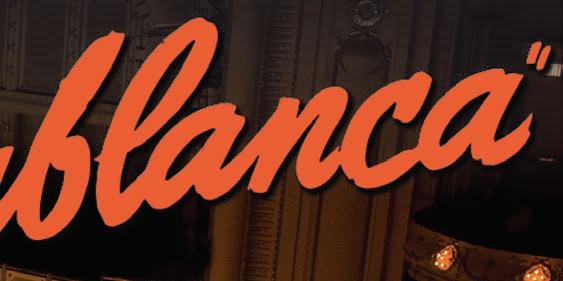
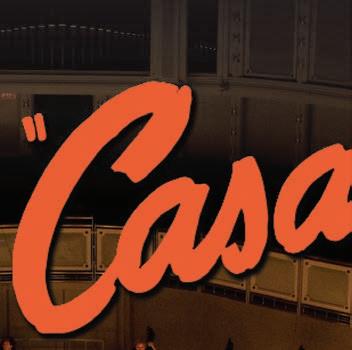









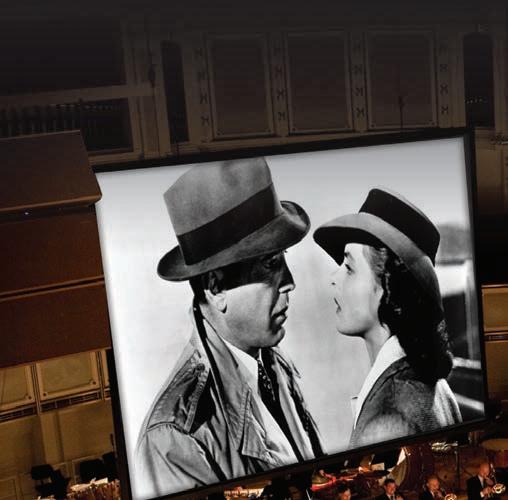
Richard Kaufman conductor MAR 13 & 15
IN CONCERT This timeless story of a man torn between love and virtue is “probably on more lists of the greatest films of all time than any other single title,” critic Roger Ebert once observed. Performing Max Steiner’s Oscar-nominated score and the memorable classic, “As Time Goes By,” the CSO brings this enchanting masterpiece to life. Artists, prices and programs subject to change. CSO.ORG | 312-294-3000 | SYMPHONY CENTER 220 s. michigan ave.
 By BRIAN O’DONNELL 24
By BRIAN O’DONNELL 24





























































 By MAYA DUKMASOVA
By MAYA DUKMASOVA

























































































 BY IRENE HSIAO
BY IRENE HSIAO
 By MARISSA DE LA CERDA
By MARISSA DE LA CERDA















 By KAYLEN RALPH
By KAYLEN RALPH
























 By BRIAN O’DONNELL
By BRIAN O’DONNELL





















































 By DAN SAVAGE
By DAN SAVAGE
















































